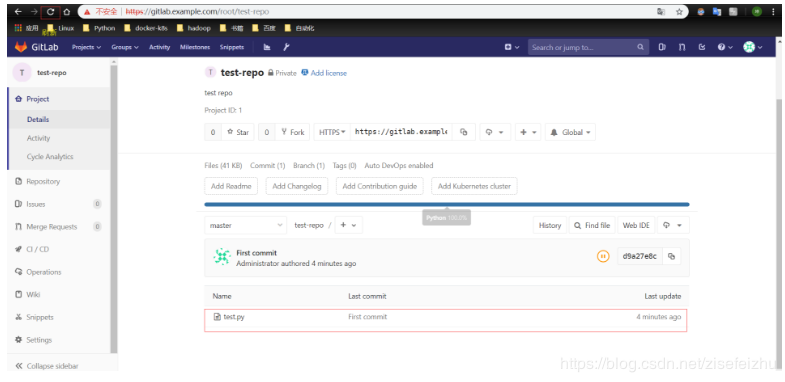前言
持续交付
版本控制器:Gitlab、GitHub 持续集成工具:jenkins 部署工具:ansible
课程安排
Gitlab搭建与流程使用 Ansible环境配置与Playbook编写规范 Jenkins环境构建与任务编写 Freestyle任务实现静态网站部署交付 Pipeline任务实现WordPress部署交付
适用对象
从事运维相关岗位的同学 想了解持续交付领域的同学 想拓宽自己的同学 奋战在运维交付第一线的同学
GitLab
什么是GitLab? GitLab是一个开源分布式版本控制系统 开发语言:Ruby 功能:管理项目源代码,版本控制,代码复用与查找
GitLab与GitHub的不同
GitHub分布式在线代码托管仓库,个人版本可直接在线免费使用,企业版本收费且需要服务器安装 GitLab分布式在线代码仓库托管软件,分社区免费版本与企业收费版本,都需要服务器安装。
GitLab的优势和应用场景
开源免费,适合中小型公司将代码放置在该系统中 差异化的版本管理,离线同步以及强大分支管理功能 便捷的GUI操作界面以及强大账号权限管理功能 集成度很高,能够集成绝大多数的开发工具 支持内置HA,保证在高并发下仍旧实现高可用性
GitLab主要服务构成
Nginx静态Web服务器 GitLab-workhorse轻量级的反向代理服务器 GitLab-shell用于处理Git命令和修改authorized keys列表 Logrotate日志文件管理工具 Postgresql数据库 Redis缓存服务器
GitLab的工作流程
创建并克隆项目 创建项目某Feature分支 编写代码并提交至该分支 推送该项目分支至远程GitLab服务器 进行代码检查并提交Master主分支合并申请 项目领导审查代码并确认合并申请
GitLab安装配置管理
利用VirtualBox 或VMware Workstation 创建测试服务器 利用Xshell登陆这台虚拟机
安装GitLab前系统预配置准备工作
1.关闭firewalld防火墙
systemctl stop firewalld
systemctl disable firewalld
2.关闭SELINX并重启系统
vim /etc/sysconfig/selinux
SELINUX=disabled
reboot
安装Omnibus GitLab-ce package
1.安装GitLab组件 yum -y install curl policycoreutils openssh-server openssh-clients postfix 2.配置YUM仓库 curl -sS https://packages.gitlab.com/install/repositories/gitlab/gitlab-ce/script.rpm.sh | sudo bash 3.更新本地缓存 yum makecache 4.启动postfix邮箱服务 systemctl start postfix systemctl enable postfix 5.安装Gitlab-ce社区版本 yum install -y gitlab-ce
Omnibus GitLab等相关配置初始化并完成安装
1.证书创建与配置加载 2.Nginx SSL代理服务配置 3.初始化GitLab相关服务并完成安装
演示
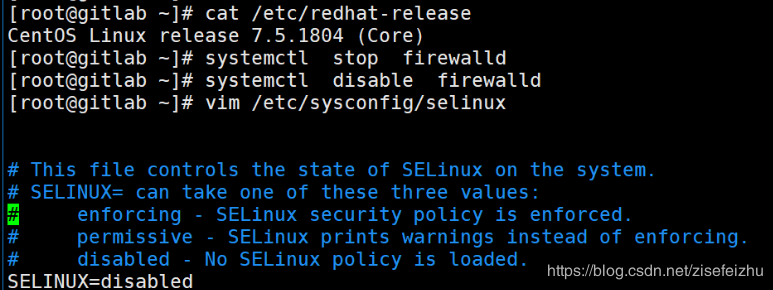
注:视频中此处yum 安装的是postfixs


创建证书
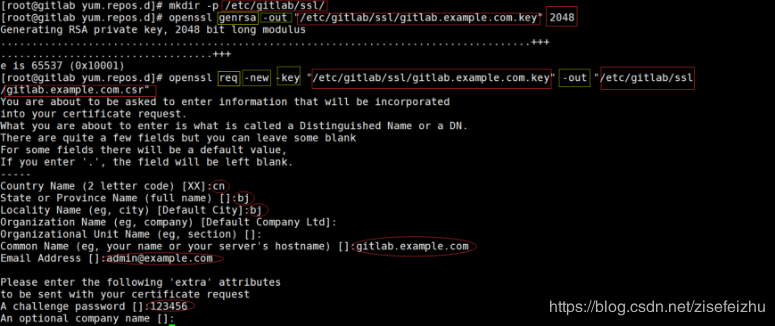
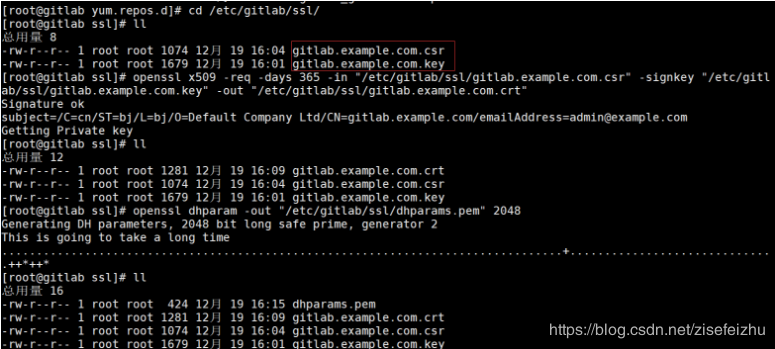
修改权限
[root@gitlab ssl]# chmod 600 *
修改配置文件
[root@gitlab ssl]# vim /etc/gitlab/gitlab.rb
13行http改为https external_url 'https://gitlab.example.com' 982行去掉注释falst改为true nginx['redirect_http_to_https'] = true 994行取点注释,修改路径 nginx['ssl_certificate'] = "/etc/gitlab/ssl/gitlab.example.com.crt" 995取点注释修改路径 nginx['ssl_certificate_key'] = "/etc/gitlab/ssl/gitlab.example.com.key" 1008 去掉注释修改路径 nginx['ssl_dhparam'] = "/etc/gitlab/ssl/dhparams.pem" # Path to dhparams.pem, eg. /etc/gitlab/ssl/dhparams.pem
[root@gitlab ssl]# cat /etc/gitlab/gitlab.rb
[root@gitlab ssl]# cat /etc/gitlab/gitlab.rb
## GitLab configuration settings
##! This file is generated during initial installation and **is not** modified
##! during upgrades.
##! Check out the latest version of this file to know about the different
##! settings that can be configured by this file, which may be found at:
##! https://gitlab.com/gitlab-org/omnibus-gitlab/raw/master/files/gitlab-config-template/gitlab.rb.template
## GitLab URL
##! URL on which GitLab will be reachable.
##! For more details on configuring external_url see:
##! https://docs.gitlab.com/omnibus/settings/configuration.html#configuring-the-external-url-for-gitlab
external_url 'https://gitlab.example.com'
## Roles for multi-instance GitLab
##! The default is to have no roles enabled, which results in GitLab running as an all-in-one instance.
##! Options:
##! redis_sentinel_role redis_master_role redis_slave_role geo_primary_role geo_secondary_role
##! For more details on each role, see:
##! https://docs.gitlab.com/omnibus/roles/README.html#roles
##!
# roles ['redis_sentinel_role', 'redis_master_role']
## Legend
##! The following notations at the beginning of each line may be used to
##! differentiate between components of this file and to easily select them using
##! a regex.
##! ## Titles, subtitles etc
##! ##! More information - Description, Docs, Links, Issues etc.
##! Configuration settings have a single # followed by a single space at the
##! beginning; Remove them to enable the setting.
##! **Configuration settings below are optional.**
##! **The values currently assigned are only examples and ARE NOT the default
##! values.**
################################################################################
################################################################################
## Configuration Settings for GitLab CE and EE ##
################################################################################
################################################################################
################################################################################
## gitlab.yml configuration
##! Docs: https://gitlab.com/gitlab-org/omnibus-gitlab/blob/master/doc/settings/gitlab.yml.md
################################################################################
# gitlab_rails['gitlab_ssh_host'] = 'ssh.host_example.com'
# gitlab_rails['time_zone'] = 'UTC'
### Email Settings
# gitlab_rails['gitlab_email_enabled'] = true
# gitlab_rails['gitlab_email_from'] = 'example@example.com'
# gitlab_rails['gitlab_email_display_name'] = 'Example'
# gitlab_rails['gitlab_email_reply_to'] = 'noreply@example.com'
# gitlab_rails['gitlab_email_subject_suffix'] = ''
### GitLab user privileges
# gitlab_rails['gitlab_default_can_create_group'] = true
# gitlab_rails['gitlab_username_changing_enabled'] = true
### Default Theme
# gitlab_rails['gitlab_default_theme'] = 2
### Default project feature settings
# gitlab_rails['gitlab_default_projects_features_issues'] = true
# gitlab_rails['gitlab_default_projects_features_merge_requests'] = true
# gitlab_rails['gitlab_default_projects_features_wiki'] = true
# gitlab_rails['gitlab_default_projects_features_snippets'] = true
# gitlab_rails['gitlab_default_projects_features_builds'] = true
# gitlab_rails['gitlab_default_projects_features_container_registry'] = true
### Automatic issue closing
###! See https://docs.gitlab.com/ce/customization/issue_closing.html for more
###! information about this pattern.
# gitlab_rails['gitlab_issue_closing_pattern'] = "((?:[Cc]los(?:e[sd]?|ing)|[Ff]ix(?:e[sd]|ing)?|[Rr]esolv(?:e[sd]?|ing)|[Ii]mplement(?:s|ed|ing)?)(:?) +(?:(?:issues? +)?%{issue_ref}(?:(?:, *| +and +)?)|([A-Z][A-Z0-9_]+-d+))+)"
### Download location
###! When a user clicks e.g. 'Download zip' on a project, a temporary zip file
###! is created in the following directory.
###! Should not be the same path, or a sub directory of any of the `git_data_dirs`
# gitlab_rails['gitlab_repository_downloads_path'] = 'tmp/repositories'
### Gravatar Settings
# gitlab_rails['gravatar_plain_url'] = 'http://www.gravatar.com/avatar/%{hash}?s=%{size}&d=identicon'
# gitlab_rails['gravatar_ssl_url'] = 'https://secure.gravatar.com/avatar/%{hash}?s=%{size}&d=identicon'
### Auxiliary jobs
###! Periodically executed jobs, to self-heal Gitlab, do external
###! synchronizations, etc.
###! Docs: https://github.com/ondrejbartas/sidekiq-cron#adding-cron-job
###! https://docs.gitlab.com/ce/ci/yaml/README.html#artifacts:expire_in
# gitlab_rails['stuck_ci_jobs_worker_cron'] = "0 0 * * *"
# gitlab_rails['expire_build_artifacts_worker_cron'] = "50 * * * *"
# gitlab_rails['pipeline_schedule_worker_cron'] = "41 * * * *"
# gitlab_rails['ci_archive_traces_cron_worker_cron'] = "17 * * * *"
# gitlab_rails['repository_check_worker_cron'] = "20 * * * *"
# gitlab_rails['admin_email_worker_cron'] = "0 0 * * 0"
# gitlab_rails['repository_archive_cache_worker_cron'] = "0 * * * *"
# gitlab_rails['pages_domain_verification_cron_worker'] = "*/15 * * * *"
### Webhook Settings
###! Number of seconds to wait for HTTP response after sending webhook HTTP POST
###! request (default: 10)
# gitlab_rails['webhook_timeout'] = 10
### Trusted proxies
###! Customize if you have GitLab behind a reverse proxy which is running on a
###! different machine.
###! **Add the IP address for your reverse proxy to the list, otherwise users
###! will appear signed in from that address.**
# gitlab_rails['trusted_proxies'] = []
### Monitoring settings
###! IP whitelist controlling access to monitoring endpoints
# gitlab_rails['monitoring_whitelist'] = ['127.0.0.0/8', '::1/128']
###! Time between sampling of unicorn socket metrics, in seconds
# gitlab_rails['monitoring_unicorn_sampler_interval'] = 10
### Reply by email
###! Allow users to comment on issues and merge requests by replying to
###! notification emails.
###! Docs: https://docs.gitlab.com/ce/administration/reply_by_email.html
# gitlab_rails['incoming_email_enabled'] = true
#### Incoming Email Address
####! The email address including the `%{key}` placeholder that will be replaced
####! to reference the item being replied to.
####! **The placeholder can be omitted but if present, it must appear in the
####! "user" part of the address (before the `@`).**
# gitlab_rails['incoming_email_address'] = "gitlab-incoming+%{key}@gmail.com"
#### Email account username
####! **With third party providers, this is usually the full email address.**
####! **With self-hosted email servers, this is usually the user part of the
####! email address.**
# gitlab_rails['incoming_email_email'] = "gitlab-incoming@gmail.com"
#### Email account password
# gitlab_rails['incoming_email_password'] = "[REDACTED]"
#### IMAP Settings
# gitlab_rails['incoming_email_host'] = "imap.gmail.com"
# gitlab_rails['incoming_email_port'] = 993
# gitlab_rails['incoming_email_ssl'] = true
# gitlab_rails['incoming_email_start_tls'] = false
#### Incoming Mailbox Settings
####! The mailbox where incoming mail will end up. Usually "inbox".
# gitlab_rails['incoming_email_mailbox_name'] = "inbox"
####! The IDLE command timeout.
# gitlab_rails['incoming_email_idle_timeout'] = 60
### Job Artifacts
# gitlab_rails['artifacts_enabled'] = true
# gitlab_rails['artifacts_path'] = "/var/opt/gitlab/gitlab-rails/shared/artifacts"
####! Job artifacts Object Store
####! Docs: https://docs.gitlab.com/ee/administration/job_artifacts.html#using-object-storage
# gitlab_rails['artifacts_object_store_enabled'] = false
# gitlab_rails['artifacts_object_store_direct_upload'] = false
# gitlab_rails['artifacts_object_store_background_upload'] = true
# gitlab_rails['artifacts_object_store_proxy_download'] = false
# gitlab_rails['artifacts_object_store_remote_directory'] = "artifacts"
# gitlab_rails['artifacts_object_store_connection'] = {
# 'provider' => 'AWS',
# 'region' => 'eu-west-1',
# 'aws_access_key_id' => 'AWS_ACCESS_KEY_ID',
# 'aws_secret_access_key' => 'AWS_SECRET_ACCESS_KEY',
# # # The below options configure an S3 compatible host instead of AWS
# # 'aws_signature_version' => 4, # For creation of signed URLs. Set to 2 if provider does not support v4.
# # 'endpoint' => 'https://s3.amazonaws.com', # default: nil - Useful for S3 compliant services such as DigitalOcean Spaces
# # 'host' => 's3.amazonaws.com',
# # 'path_style' => false # Use 'host/bucket_name/object' instead of 'bucket_name.host/object'
# }
### External merge request diffs
# gitlab_rails['external_diffs_enabled'] = false
# gitlab_rails['external_diffs_storage_path'] = "/var/opt/gitlab/gitlab-rails/shared/external-diffs"
# gitlab_rails['external_diffs_object_store_enabled'] = false
# gitlab_rails['external_diffs_object_store_direct_upload'] = false
# gitlab_rails['external_diffs_object_store_background_upload'] = false
# gitlab_rails['external_diffs_object_store_proxy_download'] = false
# gitlab_rails['external_diffs_object_store_remote_directory'] = "external-diffs"
# gitlab_rails['external_diffs_object_store_connection'] = {
# 'provider' => 'AWS',
# 'region' => 'eu-west-1',
# 'aws_access_key_id' => 'AWS_ACCESS_KEY_ID',
# 'aws_secret_access_key' => 'AWS_SECRET_ACCESS_KEY',
# # # The below options configure an S3 compatible host instead of AWS
# # 'aws_signature_version' => 4, # For creation of signed URLs. Set to 2 if provider does not support v4.
# # 'endpoint' => 'https://s3.amazonaws.com', # default: nil - Useful for S3 compliant services such as DigitalOcean Spaces
# # 'host' => 's3.amazonaws.com',
# # 'path_style' => false # Use 'host/bucket_name/object' instead of 'bucket_name.host/object'
# }
### Git LFS
# gitlab_rails['lfs_enabled'] = true
# gitlab_rails['lfs_storage_path'] = "/var/opt/gitlab/gitlab-rails/shared/lfs-objects"
# gitlab_rails['lfs_object_store_enabled'] = false
# gitlab_rails['lfs_object_store_direct_upload'] = false
# gitlab_rails['lfs_object_store_background_upload'] = true
# gitlab_rails['lfs_object_store_proxy_download'] = false
# gitlab_rails['lfs_object_store_remote_directory'] = "lfs-objects"
# gitlab_rails['lfs_object_store_connection'] = {
# 'provider' => 'AWS',
# 'region' => 'eu-west-1',
# 'aws_access_key_id' => 'AWS_ACCESS_KEY_ID',
# 'aws_secret_access_key' => 'AWS_SECRET_ACCESS_KEY',
# # # The below options configure an S3 compatible host instead of AWS
# # 'aws_signature_version' => 4, # For creation of signed URLs. Set to 2 if provider does not support v4.
# # 'endpoint' => 'https://s3.amazonaws.com', # default: nil - Useful for S3 compliant services such as DigitalOcean Spaces
# # 'host' => 's3.amazonaws.com',
# # 'path_style' => false # Use 'host/bucket_name/object' instead of 'bucket_name.host/object'
# }
### GitLab uploads
###! Docs: https://docs.gitlab.com/ee/administration/uploads.html
# gitlab_rails['uploads_storage_path'] = "/var/opt/gitlab/gitlab-rails/public"
# gitlab_rails['uploads_base_dir'] = "uploads/-/system"
# gitlab_rails['uploads_object_store_enabled'] = false
# gitlab_rails['uploads_object_store_direct_upload'] = false
# gitlab_rails['uploads_object_store_background_upload'] = true
# gitlab_rails['uploads_object_store_proxy_download'] = false
# gitlab_rails['uploads_object_store_remote_directory'] = "uploads"
# gitlab_rails['uploads_object_store_connection'] = {
# 'provider' => 'AWS',
# 'region' => 'eu-west-1',
# 'aws_access_key_id' => 'AWS_ACCESS_KEY_ID',
# 'aws_secret_access_key' => 'AWS_SECRET_ACCESS_KEY',
# # # The below options configure an S3 compatible host instead of AWS
# # 'host' => 's3.amazonaws.com',
# # 'aws_signature_version' => 4, # For creation of signed URLs. Set to 2 if provider does not support v4.
# # 'endpoint' => 'https://s3.amazonaws.com', # default: nil - Useful for S3 compliant services such as DigitalOcean Spaces
# # 'path_style' => false # Use 'host/bucket_name/object' instead of 'bucket_name.host/object'
# }
### Impersonation settings
# gitlab_rails['impersonation_enabled'] = true
### Usage Statistics
# gitlab_rails['usage_ping_enabled'] = true
### GitLab Mattermost
###! These settings are void if Mattermost is installed on the same omnibus
###! install
# gitlab_rails['mattermost_host'] = "https://mattermost.example.com"
### LDAP Settings
###! Docs: https://docs.gitlab.com/omnibus/settings/ldap.html
###! **Be careful not to break the indentation in the ldap_servers block. It is
###! in yaml format and the spaces must be retained. Using tabs will not work.**
# gitlab_rails['ldap_enabled'] = false
###! **remember to close this block with 'EOS' below**
# gitlab_rails['ldap_servers'] = YAML.load <<-'EOS'
# main: # 'main' is the GitLab 'provider ID' of this LDAP server
# label: 'LDAP'
# host: '_your_ldap_server'
# port: 389
# uid: 'sAMAccountName'
# bind_dn: '_the_full_dn_of_the_user_you_will_bind_with'
# password: '_the_password_of_the_bind_user'
# encryption: 'plain' # "start_tls" or "simple_tls" or "plain"
# verify_certificates: true
# smartcard_auth: false
# active_directory: true
# allow_username_or_email_login: false
# lowercase_usernames: false
# block_auto_created_users: false
# base: ''
# user_filter: ''
# ## EE only
# group_base: ''
# admin_group: ''
# sync_ssh_keys: false
#
# secondary: # 'secondary' is the GitLab 'provider ID' of second LDAP server
# label: 'LDAP'
# host: '_your_ldap_server'
# port: 389
# uid: 'sAMAccountName'
# bind_dn: '_the_full_dn_of_the_user_you_will_bind_with'
# password: '_the_password_of_the_bind_user'
# encryption: 'plain' # "start_tls" or "simple_tls" or "plain"
# verify_certificates: true
# smartcard_auth: false
# active_directory: true
# allow_username_or_email_login: false
# lowercase_usernames: false
# block_auto_created_users: false
# base: ''
# user_filter: ''
# ## EE only
# group_base: ''
# admin_group: ''
# sync_ssh_keys: false
# EOS
### Smartcard authentication settings
###! Docs: https://docs.gitlab.com/ee/administration/auth/smartcard.html
# gitlab_rails['smartcard_enabled'] = false
# gitlab_rails['smartcard_ca_file'] = "/etc/gitlab/ssl/CA.pem"
# gitlab_rails['smartcard_client_certificate_required_port'] = 3444
### OmniAuth Settings
###! Docs: https://docs.gitlab.com/ce/integration/omniauth.html
# gitlab_rails['omniauth_enabled'] = nil
# gitlab_rails['omniauth_allow_single_sign_on'] = ['saml']
# gitlab_rails['omniauth_sync_email_from_provider'] = 'saml'
# gitlab_rails['omniauth_sync_profile_from_provider'] = ['saml']
# gitlab_rails['omniauth_sync_profile_attributes'] = ['email']
# gitlab_rails['omniauth_auto_sign_in_with_provider'] = 'saml'
# gitlab_rails['omniauth_block_auto_created_users'] = true
# gitlab_rails['omniauth_auto_link_ldap_user'] = false
# gitlab_rails['omniauth_auto_link_saml_user'] = false
# gitlab_rails['omniauth_external_providers'] = ['twitter', 'google_oauth2']
# gitlab_rails['omniauth_providers'] = [
# {
# "name" => "google_oauth2",
# "app_id" => "YOUR APP ID",
# "app_secret" => "YOUR APP SECRET",
# "args" => { "access_type" => "offline", "approval_prompt" => "" }
# }
# ]
### Backup Settings
###! Docs: https://docs.gitlab.com/omnibus/settings/backups.html
# gitlab_rails['manage_backup_path'] = true
# gitlab_rails['backup_path'] = "/var/opt/gitlab/backups"
###! Docs: https://docs.gitlab.com/ce/raketasks/backup_restore.html#backup-archive-permissions
# gitlab_rails['backup_archive_permissions'] = 0644
# gitlab_rails['backup_pg_schema'] = 'public'
###! The duration in seconds to keep backups before they are allowed to be deleted
# gitlab_rails['backup_keep_time'] = 604800
# gitlab_rails['backup_upload_connection'] = {
# 'provider' => 'AWS',
# 'region' => 'eu-west-1',
# 'aws_access_key_id' => 'AKIAKIAKI',
# 'aws_secret_access_key' => 'secret123'
# }
# gitlab_rails['backup_upload_remote_directory'] = 'my.s3.bucket'
# gitlab_rails['backup_multipart_chunk_size'] = 104857600
###! **Turns on AWS Server-Side Encryption with Amazon S3-Managed Keys for
###! backups**
# gitlab_rails['backup_encryption'] = 'AES256'
###! The encryption key to use with AWS Server-Side Encryption.
###! Setting this value will enable Server-Side Encryption with customer provided keys;
###! otherwise S3-managed keys are used.
# gitlab_rails['backup_encryption_key'] = '<base64-encoded encryption key>'
###! **Specifies Amazon S3 storage class to use for backups. Valid values
###! include 'STANDARD', 'STANDARD_IA', and 'REDUCED_REDUNDANCY'**
# gitlab_rails['backup_storage_class'] = 'STANDARD'
### Pseudonymizer Settings
# gitlab_rails['pseudonymizer_manifest'] = 'config/pseudonymizer.yml'
# gitlab_rails['pseudonymizer_upload_remote_directory'] = 'gitlab-elt'
# gitlab_rails['pseudonymizer_upload_connection'] = {
# 'provider' => 'AWS',
# 'region' => 'eu-west-1',
# 'aws_access_key_id' => 'AKIAKIAKI',
# 'aws_secret_access_key' => 'secret123'
# }
### For setting up different data storing directory
###! Docs: https://docs.gitlab.com/omnibus/settings/configuration.html#storing-git-data-in-an-alternative-directory
###! **If you want to use a single non-default directory to store git data use a
###! path that doesn't contain symlinks.**
# git_data_dirs({
# "default" => {
# "path" => "/mnt/nfs-01/git-data"
# }
# })
### Gitaly settings
# gitlab_rails['gitaly_token'] = 'secret token'
### For storing GitLab application uploads, eg. LFS objects, build artifacts
###! Docs: https://docs.gitlab.com/ce/development/shared_files.html
# gitlab_rails['shared_path'] = '/var/opt/gitlab/gitlab-rails/shared'
### Wait for file system to be mounted
###! Docs: https://docs.gitlab.com/omnibus/settings/configuration.html#only-start-omnibus-gitlab-services-after-a-given-filesystem-is-mounted
# high_availability['mountpoint'] = ["/var/opt/gitlab/git-data", "/var/opt/gitlab/gitlab-rails/shared"]
### GitLab Shell settings for GitLab
# gitlab_rails['gitlab_shell_ssh_port'] = 22
# gitlab_rails['gitlab_shell_git_timeout'] = 800
### Extra customization
# gitlab_rails['extra_google_analytics_id'] = '_your_tracking_id'
# gitlab_rails['extra_piwik_url'] = '_your_piwik_url'
# gitlab_rails['extra_piwik_site_id'] = '_your_piwik_site_id'
##! Docs: https://docs.gitlab.com/omnibus/settings/environment-variables.html
# gitlab_rails['env'] = {
# 'BUNDLE_GEMFILE' => "/opt/gitlab/embedded/service/gitlab-rails/Gemfile",
# 'PATH' => "/opt/gitlab/bin:/opt/gitlab/embedded/bin:/bin:/usr/bin"
# }
# gitlab_rails['rack_attack_git_basic_auth'] = {
# 'enabled' => false,
# 'ip_whitelist' => ["127.0.0.1"],
# 'maxretry' => 10,
# 'findtime' => 60,
# 'bantime' => 3600
# }
# gitlab_rails['rack_attack_protected_paths'] = [
# '/users/password',
# '/users/sign_in',
# '/api/#{API::API.version}/session.json',
# '/api/#{API::API.version}/session',
# '/users',
# '/users/confirmation',
# '/unsubscribes/',
# '/import/github/personal_access_token'
# ]
###! **We do not recommend changing these directories.**
# gitlab_rails['dir'] = "/var/opt/gitlab/gitlab-rails"
# gitlab_rails['log_directory'] = "/var/log/gitlab/gitlab-rails"
### GitLab application settings
# gitlab_rails['uploads_directory'] = "/var/opt/gitlab/gitlab-rails/uploads"
# gitlab_rails['rate_limit_requests_per_period'] = 10
# gitlab_rails['rate_limit_period'] = 60
#### Change the initial default admin password and shared runner registration tokens.
####! **Only applicable on initial setup, changing these settings after database
####! is created and seeded won't yield any change.**
# gitlab_rails['initial_root_password'] = "password"
# gitlab_rails['initial_shared_runners_registration_token'] = "token"
#### Enable or disable automatic database migrations
# gitlab_rails['auto_migrate'] = true
#### This is advanced feature used by large gitlab deployments where loading
#### whole RAILS env takes a lot of time.
# gitlab_rails['rake_cache_clear'] = true
### GitLab database settings
###! Docs: https://docs.gitlab.com/omnibus/settings/database.html
###! **Only needed if you use an external database.**
# gitlab_rails['db_adapter'] = "postgresql"
# gitlab_rails['db_encoding'] = "unicode"
# gitlab_rails['db_collation'] = nil
# gitlab_rails['db_database'] = "gitlabhq_production"
# gitlab_rails['db_pool'] = 10
# gitlab_rails['db_username'] = "gitlab"
# gitlab_rails['db_password'] = nil
# gitlab_rails['db_host'] = nil
# gitlab_rails['db_port'] = 5432
# gitlab_rails['db_socket'] = nil
# gitlab_rails['db_sslmode'] = nil
# gitlab_rails['db_sslcompression'] = 0
# gitlab_rails['db_sslrootcert'] = nil
# gitlab_rails['db_prepared_statements'] = false
# gitlab_rails['db_statements_limit'] = 1000
### GitLab Redis settings
###! Connect to your own Redis instance
###! Docs: https://docs.gitlab.com/omnibus/settings/redis.html
#### Redis TCP connection
# gitlab_rails['redis_host'] = "127.0.0.1"
# gitlab_rails['redis_port'] = 6379
# gitlab_rails['redis_ssl'] = false
# gitlab_rails['redis_password'] = nil
# gitlab_rails['redis_database'] = 0
#### Redis local UNIX socket (will be disabled if TCP method is used)
# gitlab_rails['redis_socket'] = "/var/opt/gitlab/redis/redis.socket"
#### Sentinel support
####! To have Sentinel working, you must enable Redis TCP connection support
####! above and define a few Sentinel hosts below (to get a reliable setup
####! at least 3 hosts).
####! **You don't need to list every sentinel host, but the ones not listed will
####! not be used in a fail-over situation to query for the new master.**
# gitlab_rails['redis_sentinels'] = [
# {'host' => '127.0.0.1', 'port' => 26379},
# ]
#### Separate instances support
###! Docs: https://docs.gitlab.com/omnibus/settings/redis.html#running-with-multiple-redis-instances
# gitlab_rails['redis_cache_instance'] = nil
# gitlab_rails['redis_cache_sentinels'] = nil
# gitlab_rails['redis_queues_instance'] = nil
# gitlab_rails['redis_queues_sentinels'] = nil
# gitlab_rails['redis_shared_state_instance'] = nil
# gitlab_rails['redis_shared_sentinels'] = nil
### GitLab email server settings
###! Docs: https://docs.gitlab.com/omnibus/settings/smtp.html
###! **Use smtp instead of sendmail/postfix.**
# gitlab_rails['smtp_enable'] = true
# gitlab_rails['smtp_address'] = "smtp.server"
# gitlab_rails['smtp_port'] = 465
# gitlab_rails['smtp_user_name'] = "smtp user"
# gitlab_rails['smtp_password'] = "smtp password"
# gitlab_rails['smtp_domain'] = "example.com"
# gitlab_rails['smtp_authentication'] = "login"
# gitlab_rails['smtp_enable_starttls_auto'] = true
# gitlab_rails['smtp_tls'] = false
###! **Can be: 'none', 'peer', 'client_once', 'fail_if_no_peer_cert'**
###! Docs: http://api.rubyonrails.org/classes/ActionMailer/Base.html
# gitlab_rails['smtp_openssl_verify_mode'] = 'none'
# gitlab_rails['smtp_ca_path'] = "/etc/ssl/certs"
# gitlab_rails['smtp_ca_file'] = "/etc/ssl/certs/ca-certificates.crt"
################################################################################
## Container Registry settings
##! Docs: https://docs.gitlab.com/ce/administration/container_registry.html
################################################################################
# registry_external_url 'https://registry.gitlab.example.com'
### Settings used by GitLab application
# gitlab_rails['registry_enabled'] = true
# gitlab_rails['registry_host'] = "registry.gitlab.example.com"
# gitlab_rails['registry_port'] = "5005"
# gitlab_rails['registry_path'] = "/var/opt/gitlab/gitlab-rails/shared/registry"
###! **Do not change the following 3 settings unless you know what you are
###! doing**
# gitlab_rails['registry_api_url'] = "http://localhost:5000"
# gitlab_rails['registry_key_path'] = "/var/opt/gitlab/gitlab-rails/certificate.key"
# gitlab_rails['registry_issuer'] = "omnibus-gitlab-issuer"
### Settings used by Registry application
# registry['enable'] = true
# registry['username'] = "registry"
# registry['group'] = "registry"
# registry['uid'] = nil
# registry['gid'] = nil
# registry['dir'] = "/var/opt/gitlab/registry"
# registry['registry_http_addr'] = "localhost:5000"
# registry['debug_addr'] = "localhost:5001"
# registry['log_directory'] = "/var/log/gitlab/registry"
# registry['env_directory'] = "/opt/gitlab/etc/registry/env"
# registry['env'] = {
# 'SSL_CERT_DIR' => "/opt/gitlab/embedded/ssl/certs/"
# }
# registry['log_level'] = "info"
# registry['log_formatter'] = "text"
# registry['rootcertbundle'] = "/var/opt/gitlab/registry/certificate.crt"
# registry['health_storagedriver_enabled'] = true
# registry['storage_delete_enabled'] = true
# registry['validation_enabled'] = false
# registry['autoredirect'] = false
# registry['compatibility_schema1_enabled'] = false
### Registry backend storage
###! Docs: https://docs.gitlab.com/ce/administration/container_registry.html#container-registry-storage-driver
# registry['storage'] = {
# 's3' => {
# 'accesskey' => 'AKIAKIAKI',
# 'secretkey' => 'secret123',
# 'bucket' => 'gitlab-registry-bucket-AKIAKIAKI'
# }
# }
### Registry notifications endpoints
# registry['notifications'] = [
# {
# 'name' => 'test_endpoint',
# 'url' => 'https://gitlab.example.com/notify2',
# 'timeout' => '500ms',
# 'threshold' => 5,
# 'backoff' => '1s',
# 'headers' => {
# "Authorization" => ["AUTHORIZATION_EXAMPLE_TOKEN"]
# }
# }
# ]
### Default registry notifications
# registry['default_notifications_timeout'] = "500ms"
# registry['default_notifications_threshold'] = 5
# registry['default_notifications_backoff'] = "1s"
# registry['default_notifications_headers'] = {}
################################################################################
## GitLab Workhorse
##! Docs: https://gitlab.com/gitlab-org/gitlab-workhorse/blob/master/README.md
################################################################################
# gitlab_workhorse['enable'] = true
# gitlab_workhorse['ha'] = false
# gitlab_workhorse['listen_network'] = "unix"
# gitlab_workhorse['listen_umask'] = 000
# gitlab_workhorse['listen_addr'] = "/var/opt/gitlab/gitlab-workhorse/socket"
# gitlab_workhorse['auth_backend'] = "http://localhost:8080"
##! the empty string is the default in gitlab-workhorse option parser
# gitlab_workhorse['auth_socket'] = "''"
##! put an empty string on the command line
# gitlab_workhorse['pprof_listen_addr'] = "''"
# gitlab_workhorse['prometheus_listen_addr'] = "localhost:9229"
# gitlab_workhorse['dir'] = "/var/opt/gitlab/gitlab-workhorse"
# gitlab_workhorse['log_directory'] = "/var/log/gitlab/gitlab-workhorse"
# gitlab_workhorse['proxy_headers_timeout'] = "1m0s"
##! limit number of concurrent API requests, defaults to 0 which is unlimited
# gitlab_workhorse['api_limit'] = 0
##! limit number of API requests allowed to be queued, defaults to 0 which
##! disables queuing
# gitlab_workhorse['api_queue_limit'] = 0
##! duration after which we timeout requests if they sit too long in the queue
# gitlab_workhorse['api_queue_duration'] = "30s"
##! Long polling duration for job requesting for runners
# gitlab_workhorse['api_ci_long_polling_duration'] = "60s"
##! Log format: default is text, can also be json or none.
# gitlab_workhorse['log_format'] = "json"
# gitlab_workhorse['env_directory'] = "/opt/gitlab/etc/gitlab-workhorse/env"
# gitlab_workhorse['env'] = {
# 'PATH' => "/opt/gitlab/bin:/opt/gitlab/embedded/bin:/bin:/usr/bin",
# 'SSL_CERT_DIR' => "/opt/gitlab/embedded/ssl/certs/"
# }
################################################################################
## GitLab User Settings
##! Modify default git user.
##! Docs: https://docs.gitlab.com/omnibus/settings/configuration.html#changing-the-name-of-the-git-user-group
################################################################################
# user['username'] = "git"
# user['group'] = "git"
# user['uid'] = nil
# user['gid'] = nil
##! The shell for the git user
# user['shell'] = "/bin/sh"
##! The home directory for the git user
# user['home'] = "/var/opt/gitlab"
# user['git_user_name'] = "GitLab"
# user['git_user_email'] = "gitlab@#{node['fqdn']}"
################################################################################
## GitLab Unicorn
##! Tweak unicorn settings.
##! Docs: https://docs.gitlab.com/omnibus/settings/unicorn.html
################################################################################
# unicorn['enable'] = true
# unicorn['worker_timeout'] = 60
###! Minimum worker_processes is 2 at this moment
###! See https://gitlab.com/gitlab-org/gitlab-ce/issues/18771
# unicorn['worker_processes'] = 2
### Advanced settings
# unicorn['listen'] = 'localhost'
# unicorn['port'] = 8080
# unicorn['socket'] = '/var/opt/gitlab/gitlab-rails/sockets/gitlab.socket'
# unicorn['pidfile'] = '/opt/gitlab/var/unicorn/unicorn.pid'
# unicorn['tcp_nopush'] = true
# unicorn['backlog_socket'] = 1024
###! **Make sure somaxconn is equal or higher then backlog_socket**
# unicorn['somaxconn'] = 1024
###! **We do not recommend changing this setting**
# unicorn['log_directory'] = "/var/log/gitlab/unicorn"
### **Only change these settings if you understand well what they mean**
###! Docs: https://about.gitlab.com/2015/06/05/how-gitlab-uses-unicorn-and-unicorn-worker-killer/
###! https://github.com/kzk/unicorn-worker-killer
# unicorn['worker_memory_limit_min'] = "400 * 1 << 20"
# unicorn['worker_memory_limit_max'] = "650 * 1 << 20"
################################################################################
## GitLab Puma
##! Tweak puma settings. You should only use Unicorn or Puma, not both.
##! Docs: https://docs.gitlab.com/omnibus/settings/puma.html
################################################################################
# puma['enable'] = false
# puma['ha'] = false
# puma['worker_timeout'] = 60
# puma['worker_processes'] = 2
# puma['min_threads'] = 1
# puma['max_threads'] = 16
### Advanced settings
# puma['listen'] = '127.0.0.1'
# puma['port'] = 8080
# puma['socket'] = '/var/opt/gitlab/gitlab-rails/sockets/gitlab.socket'
# puma['pidfile'] = '/opt/gitlab/var/puma/puma.pid'
# puma['state_path'] = '/opt/gitlab/var/puma/puma.state'
###! **We do not recommend changing this setting**
# puma['log_directory'] = "/var/log/gitlab/puma"
### **Only change these settings if you understand well what they mean**
###! Docs: https://github.com/schneems/puma_worker_killer
# puma['per_worker_max_memory_mb'] = 650
################################################################################
## GitLab Sidekiq
################################################################################
# sidekiq['log_directory'] = "/var/log/gitlab/sidekiq"
# sidekiq['log_format'] = "default"
# sidekiq['shutdown_timeout'] = 4
# sidekiq['concurrency'] = 25
# sidekiq['metrics_enabled'] = true
# sidekiq['listen_address'] = "localhost"
# sidekiq['listen_port'] = 8082
################################################################################
## gitlab-shell
################################################################################
# gitlab_shell['audit_usernames'] = false
# gitlab_shell['log_level'] = 'INFO'
# gitlab_shell['log_format'] = 'json'
# gitlab_shell['http_settings'] = { user: 'username', password: 'password', ca_file: '/etc/ssl/cert.pem', ca_path: '/etc/pki/tls/certs', self_signed_cert: false}
# gitlab_shell['log_directory'] = "/var/log/gitlab/gitlab-shell/"
# gitlab_shell['custom_hooks_dir'] = "/opt/gitlab/embedded/service/gitlab-shell/hooks"
# gitlab_shell['auth_file'] = "/var/opt/gitlab/.ssh/authorized_keys"
### Git trace log file.
###! If set, git commands receive GIT_TRACE* environment variables
###! Docs: https://git-scm.com/book/es/v2/Git-Internals-Environment-Variables#Debugging
###! An absolute path starting with / – the trace output will be appended to
###! that file. It needs to exist so we can check permissions and avoid
###! throwing warnings to the users.
# gitlab_shell['git_trace_log_file'] = "/var/log/gitlab/gitlab-shell/gitlab-shell-git-trace.log"
##! **We do not recommend changing this directory.**
# gitlab_shell['dir'] = "/var/opt/gitlab/gitlab-shell"
################################################################
## GitLab PostgreSQL
################################################################
###! Changing any of these settings requires a restart of postgresql.
###! By default, reconfigure reloads postgresql if it is running. If you
###! change any of these settings, be sure to run `gitlab-ctl restart postgresql`
###! after reconfigure in order for the changes to take effect.
# postgresql['enable'] = true
# postgresql['listen_address'] = nil
# postgresql['port'] = 5432
# postgresql['data_dir'] = "/var/opt/gitlab/postgresql/data"
##! **recommend value is 1/4 of total RAM, up to 14GB.**
# postgresql['shared_buffers'] = "256MB"
### Advanced settings
# postgresql['ha'] = false
# postgresql['dir'] = "/var/opt/gitlab/postgresql"
# postgresql['log_directory'] = "/var/log/gitlab/postgresql"
# postgresql['username'] = "gitlab-psql"
# postgresql['group'] = "gitlab-psql"
##! `SQL_USER_PASSWORD_HASH` can be generated using the command `gitlab-ctl pg-password-md5 gitlab`
# postgresql['sql_user_password'] = 'SQL_USER_PASSWORD_HASH'
# postgresql['uid'] = nil
# postgresql['gid'] = nil
# postgresql['shell'] = "/bin/sh"
# postgresql['home'] = "/var/opt/gitlab/postgresql"
# postgresql['user_path'] = "/opt/gitlab/embedded/bin:/opt/gitlab/bin:$PATH"
# postgresql['sql_user'] = "gitlab"
# postgresql['max_connections'] = 200
# postgresql['md5_auth_cidr_addresses'] = []
# postgresql['trust_auth_cidr_addresses'] = []
# postgresql['wal_buffers'] = "-1"
# postgresql['autovacuum_max_workers'] = "3"
# postgresql['autovacuum_freeze_max_age'] = "200000000"
# postgresql['log_statement'] = nil
# postgresql['track_activity_query_size'] = "1024"
# postgresql['shared_preload_libraries'] = nil
# postgresql['dynamic_shared_memory_type'] = nil
# postgresql['hot_standby'] = "off"
### SSL settings
# See https://www.postgresql.org/docs/9.6/static/runtime-config-connection.html#GUC-SSL-CERT-FILE for more details
# postgresql['ssl'] = 'on'
# postgresql['ssl_ciphers'] = 'HIGH:MEDIUM:+3DES:!aNULL:!SSLv3:!TLSv1'
# postgresql['ssl_cert_file'] = 'server.crt'
# postgresql['ssl_key_file'] = 'server.key'
# postgresql['ssl_ca_file'] = '/opt/gitlab/embedded/ssl/certs/cacert.pem'
# postgresql['ssl_crl_file'] = nil
### Replication settings
###! Note, some replication settings do not require a full restart. They are documented below.
# postgresql['wal_level'] = "hot_standby"
# postgresql['max_wal_senders'] = 5
# postgresql['max_replication_slots'] = 0
# postgresql['max_locks_per_transaction'] = 128
# Backup/Archive settings
# postgresql['archive_mode'] = "off"
###! Changing any of these settings only requires a reload of postgresql. You do not need to
###! restart postgresql if you change any of these and run reconfigure.
# postgresql['work_mem'] = "16MB"
# postgresql['maintenance_work_mem'] = "16MB"
# postgresql['checkpoint_segments'] = 10
# postgresql['checkpoint_timeout'] = "5min"
# postgresql['checkpoint_completion_target'] = 0.9
# postgresql['effective_io_concurrency'] = 1
# postgresql['checkpoint_warning'] = "30s"
# postgresql['effective_cache_size'] = "1MB"
# postgresql['shmmax'] = 17179869184 # or 4294967295
# postgresql['shmall'] = 4194304 # or 1048575
# postgresql['autovacuum'] = "on"
# postgresql['log_autovacuum_min_duration'] = "-1"
# postgresql['autovacuum_naptime'] = "1min"
# postgresql['autovacuum_vacuum_threshold'] = "50"
# postgresql['autovacuum_analyze_threshold'] = "50"
# postgresql['autovacuum_vacuum_scale_factor'] = "0.02"
# postgresql['autovacuum_analyze_scale_factor'] = "0.01"
# postgresql['autovacuum_vacuum_cost_delay'] = "20ms"
# postgresql['autovacuum_vacuum_cost_limit'] = "-1"
# postgresql['statement_timeout'] = "60000"
# postgresql['idle_in_transaction_session_timeout'] = "60000"
# postgresql['log_line_prefix'] = "%a"
# postgresql['max_worker_processes'] = 8
# postgresql['max_parallel_workers_per_gather'] = 0
# postgresql['log_lock_waits'] = 1
# postgresql['deadlock_timeout'] = '5s'
# postgresql['track_io_timing'] = 0
# postgresql['default_statistics_target'] = 1000
### Available in PostgreSQL 9.6 and later
# postgresql['min_wal_size'] = 80MB
# postgresql['max_wal_size'] = 1GB
# Backup/Archive settings
# postgresql['archive_command'] = nil
# postgresql['archive_timeout'] = "0"
### Replication settings
# postgresql['sql_replication_user'] = "gitlab_replicator"
# postgresql['sql_replication_password'] = "md5 hash of postgresql password" # You can generate with `gitlab-ctl pg-password-md5 <dbuser>`
# postgresql['wal_keep_segments'] = 10
# postgresql['max_standby_archive_delay'] = "30s"
# postgresql['max_standby_streaming_delay'] = "30s"
# postgresql['synchronous_commit'] = on
# postgresql['synchronous_standby_names'] = ''
# postgresql['hot_standby_feedback'] = 'off'
# postgresql['random_page_cost'] = 2.0
# postgresql['log_temp_files'] = -1
# postgresql['log_checkpoints'] = 'off'
# To add custom entries to pg_hba.conf use the following
# postgresql['custom_pg_hba_entries'] = {
# APPLICATION: [ # APPLICATION should identify what the settings are used for
# {
# type: example,
# database: example,
# user: example,
# cidr: example,
# method: example,
# option: example
# }
# ]
# }
# See https://www.postgresql.org/docs/9.6/static/auth-pg-hba-conf.html for an explanation
# of the values
################################################################################
## GitLab Redis
##! **Can be disabled if you are using your own Redis instance.**
##! Docs: https://docs.gitlab.com/omnibus/settings/redis.html
################################################################################
# redis['enable'] = true
# redis['ha'] = false
# redis['hz'] = 10
# redis['dir'] = "/var/opt/gitlab/redis"
# redis['log_directory'] = "/var/log/gitlab/redis"
# redis['username'] = "gitlab-redis"
# redis['group'] = "gitlab-redis"
# redis['maxclients'] = "10000"
# redis['maxmemory'] = "0"
# redis['maxmemory_policy'] = "noeviction"
# redis['maxmemory_samples'] = "5"
# redis['tcp_backlog'] = 511
# redis['tcp_timeout'] = "60"
# redis['tcp_keepalive'] = "300"
# redis['uid'] = nil
# redis['gid'] = nil
###! **To enable only Redis service in this machine, uncomment
###! one of the lines below (choose master or slave instance types).**
###! Docs: https://docs.gitlab.com/omnibus/settings/redis.html
###! https://docs.gitlab.com/ce/administration/high_availability/redis.html
# redis_master_role['enable'] = true
# redis_slave_role['enable'] = true
### Redis TCP support (will disable UNIX socket transport)
# redis['bind'] = '0.0.0.0' # or specify an IP to bind to a single one
# redis['port'] = 6379
# redis['password'] = 'redis-password-goes-here'
### Redis Sentinel support
###! **You need a master slave Redis replication to be able to do failover**
###! **Please read the documentation before enabling it to understand the
###! caveats:**
###! Docs: https://docs.gitlab.com/ce/administration/high_availability/redis.html
### Replication support
#### Slave Redis instance
# redis['master'] = false # by default this is true
#### Slave and Sentinel shared configuration
####! **Both need to point to the master Redis instance to get replication and
####! heartbeat monitoring**
# redis['master_name'] = 'gitlab-redis'
# redis['master_ip'] = nil
# redis['master_port'] = 6379
#### Support to run redis slaves in a Docker or NAT environment
####! Docs: https://redis.io/topics/replication#configuring-replication-in-docker-and-nat
# redis['announce_ip'] = nil
# redis['announce_port'] = nil
####! **Master password should have the same value defined in
####! redis['password'] to enable the instance to transition to/from
####! master/slave in a failover event.**
# redis['master_password'] = 'redis-password-goes-here'
####! Increase these values when your slaves can't catch up with master
# redis['client_output_buffer_limit_normal'] = '0 0 0'
# redis['client_output_buffer_limit_slave'] = '256mb 64mb 60'
# redis['client_output_buffer_limit_pubsub'] = '32mb 8mb 60'
#####! Redis snapshotting frequency
#####! Set to [] to disable
#####! Set to [''] to clear previously set values
# redis['save'] = [ '900 1', '300 10', '60 10000' ]
################################################################################
## GitLab Web server
##! Docs: https://docs.gitlab.com/omnibus/settings/nginx.html#using-a-non-bundled-web-server
################################################################################
##! When bundled nginx is disabled we need to add the external webserver user to
##! the GitLab webserver group.
# web_server['external_users'] = []
# web_server['username'] = 'gitlab-www'
# web_server['group'] = 'gitlab-www'
# web_server['uid'] = nil
# web_server['gid'] = nil
# web_server['shell'] = '/bin/false'
# web_server['home'] = '/var/opt/gitlab/nginx'
################################################################################
## GitLab NGINX
##! Docs: https://docs.gitlab.com/omnibus/settings/nginx.html
################################################################################
# nginx['enable'] = true
# nginx['client_max_body_size'] = '250m'
nginx['redirect_http_to_https'] = true
# nginx['redirect_http_to_https_port'] = 80
##! Most root CA's are included by default
# nginx['ssl_client_certificate'] = "/etc/gitlab/ssl/ca.crt"
##! enable/disable 2-way SSL client authentication
# nginx['ssl_verify_client'] = "off"
##! if ssl_verify_client on, verification depth in the client certificates chain
# nginx['ssl_verify_depth'] = "1"
nginx['ssl_certificate'] = "/etc/gitlab/ssl/gitlab.example.com.crt"
nginx['ssl_certificate_key'] = "/etc/gitlab/ssl/gitlab.example.com.key"
# nginx['ssl_ciphers'] = "ECDHE-RSA-AES256-GCM-SHA384:ECDHE-RSA-AES128-GCM-SHA256"
# nginx['ssl_prefer_server_ciphers'] = "on"
##! **Recommended by: https://raymii.org/s/tutorials/Strong_SSL_Security_On_nginx.html
##! https://cipherli.st/**
# nginx['ssl_protocols'] = "TLSv1.1 TLSv1.2"
##! **Recommended in: https://nginx.org/en/docs/http/ngx_http_ssl_module.html**
# nginx['ssl_session_cache'] = "builtin:1000 shared:SSL:10m"
##! **Default according to https://nginx.org/en/docs/http/ngx_http_ssl_module.html**
# nginx['ssl_session_timeout'] = "5m"
nginx['ssl_dhparam'] = "/etc/gitlab/ssl/dhparams.pem" # Path to dhparams.pem, eg. /etc/gitlab/ssl/dhparams.pem
# nginx['listen_addresses'] = ['*', '[::]']
##! **Defaults to forcing web browsers to always communicate using only HTTPS**
##! Docs: https://docs.gitlab.com/omnibus/settings/nginx.html#setting-http-strict-transport-security
# nginx['hsts_max_age'] = 31536000
# nginx['hsts_include_subdomains'] = false
##! **Docs: http://nginx.org/en/docs/http/ngx_http_gzip_module.html**
# nginx['gzip_enabled'] = true
##! **Override only if you use a reverse proxy**
##! Docs: https://docs.gitlab.com/omnibus/settings/nginx.html#setting-the-nginx-listen-port
# nginx['listen_port'] = nil
##! **Override only if your reverse proxy internally communicates over HTTP**
##! Docs: https://docs.gitlab.com/omnibus/settings/nginx.html#supporting-proxied-ssl
# nginx['listen_https'] = nil
# nginx['custom_gitlab_server_config'] = "location ^~ /foo-namespace/bar-project/raw/ {
deny all;
}
"
# nginx['custom_nginx_config'] = "include /etc/nginx/conf.d/example.conf;"
# nginx['proxy_read_timeout'] = 3600
# nginx['proxy_connect_timeout'] = 300
# nginx['proxy_set_headers'] = {
# "Host" => "$http_host_with_default",
# "X-Real-IP" => "$remote_addr",
# "X-Forwarded-For" => "$proxy_add_x_forwarded_for",
# "X-Forwarded-Proto" => "https",
# "X-Forwarded-Ssl" => "on",
# "Upgrade" => "$http_upgrade",
# "Connection" => "$connection_upgrade"
# }
# nginx['proxy_cache_path'] = 'proxy_cache keys_zone=gitlab:10m max_size=1g levels=1:2'
# nginx['proxy_cache'] = 'gitlab'
# nginx['http2_enabled'] = true
# nginx['real_ip_trusted_addresses'] = []
# nginx['real_ip_header'] = nil
# nginx['real_ip_recursive'] = nil
# nginx['custom_error_pages'] = {
# '404' => {
# 'title' => 'Example title',
# 'header' => 'Example header',
# 'message' => 'Example message'
# }
# }
### Advanced settings
# nginx['dir'] = "/var/opt/gitlab/nginx"
# nginx['log_directory'] = "/var/log/gitlab/nginx"
# nginx['worker_processes'] = 4
# nginx['worker_connections'] = 10240
# nginx['log_format'] = '$remote_addr - $remote_user [$time_local] "$request" $status $body_bytes_sent "$http_referer" "$http_user_agent"'
# nginx['sendfile'] = 'on'
# nginx['tcp_nopush'] = 'on'
# nginx['tcp_nodelay'] = 'on'
# nginx['gzip'] = "on"
# nginx['gzip_http_version'] = "1.0"
# nginx['gzip_comp_level'] = "2"
# nginx['gzip_proxied'] = "any"
# nginx['gzip_types'] = [ "text/plain", "text/css", "application/x-javascript", "text/xml", "application/xml", "application/xml+rss", "text/javascript", "application/json" ]
# nginx['keepalive_timeout'] = 65
# nginx['cache_max_size'] = '5000m'
# nginx['server_names_hash_bucket_size'] = 64
##! These paths have proxy_request_buffering disabled
# nginx['request_buffering_off_path_regex'] = ".git/git-receive-pack$|.git/info/refs?service=git-receive-pack$|.git/gitlab-lfs/objects|.git/info/lfs/objects/batch$"
### Nginx status
# nginx['status'] = {
# "enable" => true,
# "listen_addresses" => ["127.0.0.1"],
# "fqdn" => "dev.example.com",
# "port" => 9999,
# "vts_enable" => true,
# "options" => {
# "stub_status" => "on", # Turn on stats
# "server_tokens" => "off", # Don't show the version of NGINX
# "access_log" => "off", # Disable logs for stats
# "allow" => "127.0.0.1", # Only allow access from localhost
# "deny" => "all" # Deny access to anyone else
# }
# }
################################################################################
## GitLab Logging
##! Docs: https://docs.gitlab.com/omnibus/settings/logs.html
################################################################################
# logging['svlogd_size'] = 200 * 1024 * 1024 # rotate after 200 MB of log data
# logging['svlogd_num'] = 30 # keep 30 rotated log files
# logging['svlogd_timeout'] = 24 * 60 * 60 # rotate after 24 hours
# logging['svlogd_filter'] = "gzip" # compress logs with gzip
# logging['svlogd_udp'] = nil # transmit log messages via UDP
# logging['svlogd_prefix'] = nil # custom prefix for log messages
# logging['logrotate_frequency'] = "daily" # rotate logs daily
# logging['logrotate_size'] = nil # do not rotate by size by default
# logging['logrotate_rotate'] = 30 # keep 30 rotated logs
# logging['logrotate_compress'] = "compress" # see 'man logrotate'
# logging['logrotate_method'] = "copytruncate" # see 'man logrotate'
# logging['logrotate_postrotate'] = nil # no postrotate command by default
# logging['logrotate_dateformat'] = nil # use date extensions for rotated files rather than numbers e.g. a value of "-%Y-%m-%d" would give rotated files like production.log-2016-03-09.gz
### UDP log forwarding
##! Docs: http://docs.gitlab.com/omnibus/settings/logs.html#udp-log-forwarding
##! remote host to ship log messages to via UDP
# logging['udp_log_shipping_host'] = nil
##! override the hostname used when logs are shipped via UDP,
## by default the system hostname will be used.
# logging['udp_log_shipping_hostname'] = nil
##! remote port to ship log messages to via UDP
# logging['udp_log_shipping_port'] = 514
################################################################################
## Logrotate
##! Docs: https://docs.gitlab.com/omnibus/settings/logs.html#logrotate
##! You can disable built in logrotate feature.
################################################################################
# logrotate['enable'] = true
################################################################################
## Users and groups accounts
##! Disable management of users and groups accounts.
##! **Set only if creating accounts manually**
##! Docs: https://docs.gitlab.com/omnibus/settings/configuration.html#disable-user-and-group-account-management
################################################################################
# manage_accounts['enable'] = false
################################################################################
## Storage directories
##! Disable managing storage directories
##! Docs: https://docs.gitlab.com/omnibus/settings/configuration.html#disable-storage-directories-management
################################################################################
##! **Set only if the select directories are created manually**
# manage_storage_directories['enable'] = false
# manage_storage_directories['manage_etc'] = false
################################################################################
## Runtime directory
##! Docs: https://docs.gitlab.com//omnibus/settings/configuration.html#configuring-runtime-directory
################################################################################
# runtime_dir '/run'
################################################################################
## Git
##! Advanced setting for configuring git system settings for omnibus-gitlab
##! internal git
################################################################################
##! For multiple options under one header use array of comma separated values,
##! eg.:
##! { "receive" => ["fsckObjects = true"], "alias" => ["st = status", "co = checkout"] }
# omnibus_gitconfig['system'] = {
# "pack" => ["threads = 1"],
# "receive" => ["fsckObjects = true", "advertisePushOptions = true"],
# "repack" => ["writeBitmaps = true"],
# "transfer" => ["hideRefs=^refs/tmp/", "hideRefs=^refs/keep-around/", "hideRefs=^refs/remotes/"],
# }
################################################################################
## GitLab Pages
##! Docs: https://docs.gitlab.com/ce/pages/administration.html
################################################################################
##! Define to enable GitLab Pages
# pages_external_url "http://pages.example.com/"
# gitlab_pages['enable'] = false
##! Configure to expose GitLab Pages on external IP address, serving the HTTP
# gitlab_pages['external_http'] = []
##! Configure to expose GitLab Pages on external IP address, serving the HTTPS
# gitlab_pages['external_https'] = []
##! Configure to enable health check endpoint on GitLab Pages
# gitlab_pages['status_uri'] = "/@status"
##! Tune the maximum number of concurrent connections GitLab Pages will handle.
##! This should be in the range 1 - 10000, defaulting to 5000.
# gitlab_pages['max_connections'] = 5000
##! Configure to use JSON structured logging in GitLab Pages
# gitlab_pages['log_format'] = "json"
##! Configure verbose logging for GitLab Pages
# gitlab_pages['log_verbose'] = false
##! Listen for requests forwarded by reverse proxy
# gitlab_pages['listen_proxy'] = "localhost:8090"
# gitlab_pages['redirect_http'] = true
# gitlab_pages['use_http2'] = true
# gitlab_pages['dir'] = "/var/opt/gitlab/gitlab-pages"
# gitlab_pages['log_directory'] = "/var/log/gitlab/gitlab-pages"
# gitlab_pages['artifacts_server'] = true
# gitlab_pages['artifacts_server_url'] = nil # Defaults to external_url + '/api/v4'
# gitlab_pages['artifacts_server_timeout'] = 10
##! Environments that do not support bind-mounting should set this parameter to
##! true. This is incompatible with the artifacts server
# gitlab_pages['inplace_chroot'] = false
##! Prometheus metrics for Pages docs: https://gitlab.com/gitlab-org/gitlab-pages/#enable-prometheus-metrics
# gitlab_pages['metrics_address'] = ":9235"
##! Configure the pages admin API
# gitlab_pages['admin_secret_token'] = 'custom secret'
# gitlab_pages['admin_https_listener'] = '0.0.0.0:5678'
# gitlab_pages['admin_https_cert'] = '/etc/gitlab/pages-admin.crt'
# gitlab_pages['admin_https_key'] = '/etc/gitlab/pages-admin.key'
##! Client side configuration for gitlab-pages admin API, in case pages runs on a different host
# gitlab_rails['pages_admin_address'] = 'pages.gitlab.example.com:5678'
# gitlab_rails['pages_admin_certificate'] = '/etc/gitlab/pages-admin.crt'
##! Pages access control
# gitlab_pages['access_control'] = false
# gitlab_pages['gitlab_id'] = nil # Automatically generated if not present
# gitlab_pages['gitlab_secret'] = nil # Generated if not present
# gitlab_pages['auth_redirect_uri'] = nil # Defaults to projects subdomain of pages_external_url and + '/auth'
# gitlab_pages['auth_server'] = nil # Defaults to external_url
# gitlab_pages['auth_secret'] = nil # Generated if not present
################################################################################
## GitLab Pages NGINX
################################################################################
# All the settings defined in the "GitLab Nginx" section are also available in
# this "GitLab Pages NGINX" section, using the key `pages_nginx`. However,
# those settings should be explicitly set. That is, settings given as
# `nginx['some_setting']` WILL NOT be automatically replicated as
# `pages_nginx['some_setting']` and should be set separately.
# Below you can find settings that are exclusive to "GitLab Pages NGINX"
# pages_nginx['enable'] = false
# gitlab_rails['pages_path'] = "/var/opt/gitlab/gitlab-rails/shared/pages"
################################################################################
## GitLab CI
##! Docs: https://docs.gitlab.com/ce/ci/quick_start/README.html
################################################################################
# gitlab_ci['gitlab_ci_all_broken_builds'] = true
# gitlab_ci['gitlab_ci_add_pusher'] = true
# gitlab_ci['builds_directory'] = '/var/opt/gitlab/gitlab-ci/builds'
################################################################################
## GitLab Mattermost
##! Docs: https://docs.gitlab.com/omnibus/gitlab-mattermost
################################################################################
# mattermost_external_url 'http://mattermost.example.com'
# mattermost['enable'] = false
# mattermost['username'] = 'mattermost'
# mattermost['group'] = 'mattermost'
# mattermost['uid'] = nil
# mattermost['gid'] = nil
# mattermost['home'] = '/var/opt/gitlab/mattermost'
# mattermost['database_name'] = 'mattermost_production'
# mattermost['env'] = {
# 'SSL_CERT_DIR' => "/opt/gitlab/embedded/ssl/certs/"
# }
# mattermost['service_address'] = "127.0.0.1"
# mattermost['service_port'] = "8065"
# mattermost['service_site_url'] = nil
# mattermost['service_allowed_untrusted_internal_connections'] = ""
# mattermost['service_enable_api_team_deletion'] = true
# mattermost['team_site_name'] = "GitLab Mattermost"
# mattermost['sql_driver_name'] = 'mysql'
# mattermost['sql_data_source'] = "mmuser:mostest@tcp(dockerhost:3306)/mattermost_test?charset=utf8mb4,utf8"
# mattermost['log_file_directory'] = '/var/log/gitlab/mattermost/'
# mattermost['gitlab_enable'] = false
# mattermost['gitlab_id'] = "12345656"
# mattermost['gitlab_secret'] = "123456789"
# mattermost['gitlab_scope'] = ""
# mattermost['gitlab_auth_endpoint'] = "http://gitlab.example.com/oauth/authorize"
# mattermost['gitlab_token_endpoint'] = "http://gitlab.example.com/oauth/token"
# mattermost['gitlab_user_api_endpoint'] = "http://gitlab.example.com/api/v4/user"
# mattermost['file_directory'] = "/var/opt/gitlab/mattermost/data"
# mattermost['plugin_directory'] = "/var/opt/gitlab/mattermost/plugins"
# mattermost['plugin_client_directory'] = "/var/opt/gitlab/mattermost/client-plugins"
################################################################################
## Mattermost NGINX
################################################################################
# All the settings defined in the "GitLab Nginx" section are also available in
# this "Mattermost NGINX" section, using the key `mattermost_nginx`. However,
# those settings should be explicitly set. That is, settings given as
# `nginx['some_setting']` WILL NOT be automatically replicated as
# `mattermost_nginx['some_setting']` and should be set separately.
# Below you can find settings that are exclusive to "Mattermost NGINX"
# mattermost_nginx['enable'] = false
# mattermost_nginx['custom_gitlab_mattermost_server_config'] = "location ^~ /foo-namespace/bar-project/raw/ {
deny all;
}
"
# mattermost_nginx['proxy_set_headers'] = {
# "Host" => "$http_host",
# "X-Real-IP" => "$remote_addr",
# "X-Forwarded-For" => "$proxy_add_x_forwarded_for",
# "X-Frame-Options" => "SAMEORIGIN",
# "X-Forwarded-Proto" => "https",
# "X-Forwarded-Ssl" => "on",
# "Upgrade" => "$http_upgrade",
# "Connection" => "$connection_upgrade"
# }
################################################################################
## Registry NGINX
################################################################################
# All the settings defined in the "GitLab Nginx" section are also available in
# this "Registry NGINX" section, using the key `registry_nginx`. However, those
# settings should be explicitly set. That is, settings given as
# `nginx['some_setting']` WILL NOT be automatically replicated as
# `registry_nginx['some_setting']` and should be set separately.
# Below you can find settings that are exclusive to "Registry NGINX"
# registry_nginx['enable'] = false
# registry_nginx['proxy_set_headers'] = {
# "Host" => "$http_host",
# "X-Real-IP" => "$remote_addr",
# "X-Forwarded-For" => "$proxy_add_x_forwarded_for",
# "X-Forwarded-Proto" => "https",
# "X-Forwarded-Ssl" => "on"
# }
################################################################################
## Prometheus
##! Docs: https://docs.gitlab.com/ce/administration/monitoring/prometheus/
################################################################################
# prometheus['enable'] = true
# prometheus['monitor_kubernetes'] = true
# prometheus['username'] = 'gitlab-prometheus'
# prometheus['group'] = 'gitlab-prometheus'
# prometheus['uid'] = nil
# prometheus['gid'] = nil
# prometheus['shell'] = '/bin/sh'
# prometheus['home'] = '/var/opt/gitlab/prometheus'
# prometheus['log_directory'] = '/var/log/gitlab/prometheus'
# prometheus['rules_files'] = ['/var/opt/gitlab/prometheus/rules/*.rules']
# prometheus['scrape_interval'] = 15
# prometheus['scrape_timeout'] = 15
# prometheus['chunk_encoding_version'] = 2
# prometheus['env_directory'] = '/opt/gitlab/etc/prometheus/env'
# prometheus['env'] = {
# 'SSL_CERT_DIR' => "/opt/gitlab/embedded/ssl/certs/"
# }
#
### Custom scrape configs
#
# Prometheus can scrape additional jobs via scrape_configs. The default automatically
# includes all of the exporters supported by the omnibus config.
#
# See: https://prometheus.io/docs/operating/configuration/#<scrape_config>
#
# Example:
#
# prometheus['scrape_configs'] = [
# {
# 'job_name': 'example',
# 'static_configs' => [
# 'targets' => ['hostname:port'],
# ],
# },
# ]
#
### Prometheus Memory Management
#
# Prometheus needs to be configured for how much memory is used.
# * This sets the target heap size.
# * This value accounts for approximately 2/3 of the memory used by the server.
# * The recommended memory is 4kb per unique metrics time-series.
# See: https://prometheus.io/docs/operating/storage/#memory-usage
#
# prometheus['target_heap_size'] = (
# # Use 25mb + 2% of total memory for Prometheus memory.
# 26_214_400 + (node['memory']['total'].to_i * 1024 * 0.02 )
# ).to_i
#
# prometheus['flags'] = {
# 'storage.local.path' => "#{node['gitlab']['prometheus']['home']}/data",
# 'storage.local.chunk-encoding-version' => user_config['chunk-encoding-version'],
# 'storage.local.target-heap-size' => node['gitlab']['prometheus']['target-heap-size'],
# 'config.file' => "#{node['gitlab']['prometheus']['home']}/prometheus.yml"
# }
##! Advanced settings. Should be changed only if absolutely needed.
# prometheus['listen_address'] = 'localhost:9090'
################################################################################
## Prometheus Alertmanager
##! Docs: https://docs.gitlab.com/ce/administration/monitoring/prometheus/alertmanager.html
################################################################################
# alertmanager['enable'] = true
# alertmanager['home'] = '/var/opt/gitlab/alertmanager'
# alertmanager['log_directory'] = '/var/log/gitlab/alertmanager'
# alertmanager['admin_email'] = 'admin@example.com'
# alertmanager['flags'] = {
# 'web.listen-address' => "#{node['gitlab']['alertmanager']['listen_address']}"
# 'storage.path' => "#{node['gitlab']['alertmanager']['home']}/data"
# 'config.file' => "#{node['gitlab']['alertmanager']['home']}/alertmanager.yml"
# }
# alertmanager['env_directory'] = '/opt/gitlab/etc/alertmanager/env'
# alertmanager['env'] = {
# 'SSL_CERT_DIR' => "/opt/gitlab/embedded/ssl/certs/"
# }
##! Advanced settings. Should be changed only if absolutely needed.
# alertmanager['listen_address'] = 'localhost:9093'
################################################################################
## Prometheus Node Exporter
##! Docs: https://docs.gitlab.com/ce/administration/monitoring/prometheus/node_exporter.html
################################################################################
# node_exporter['enable'] = true
# node_exporter['home'] = '/var/opt/gitlab/node-exporter'
# node_exporter['log_directory'] = '/var/log/gitlab/node-exporter'
# node_exporter['flags'] = {
# 'collector.textfile.directory' => "#{node['gitlab']['node-exporter']['home']}/textfile_collector"
# }
# node_exporter['env_directory'] = '/opt/gitlab/etc/node-exporter/env'
# node_exporter['env'] = {
# 'SSL_CERT_DIR' => "/opt/gitlab/embedded/ssl/certs/"
# }
##! Advanced settings. Should be changed only if absolutely needed.
# node_exporter['listen_address'] = 'localhost:9100'
################################################################################
## Prometheus Redis exporter
##! Docs: https://docs.gitlab.com/ce/administration/monitoring/prometheus/redis_exporter.html
################################################################################
# redis_exporter['enable'] = true
# redis_exporter['log_directory'] = '/var/log/gitlab/redis-exporter'
# redis_exporter['flags'] = {
# 'redis.addr' => "unix://#{node['gitlab']['gitlab-rails']['redis_socket']}",
# }
# redis_exporter['env_directory'] = '/opt/gitlab/etc/redis-exporter/env'
# redis_exporter['env'] = {
# 'SSL_CERT_DIR' => "/opt/gitlab/embedded/ssl/certs/"
# }
##! Advanced settings. Should be changed only if absolutely needed.
# redis_exporter['listen_address'] = 'localhost:9121'
################################################################################
## Prometheus Postgres exporter
##! Docs: https://docs.gitlab.com/ce/administration/monitoring/prometheus/postgres_exporter.html
################################################################################
# postgres_exporter['enable'] = true
# postgres_exporter['home'] = '/var/opt/gitlab/postgres-exporter'
# postgres_exporter['log_directory'] = '/var/log/gitlab/postgres-exporter'
# postgres_exporter['flags'] = {}
# postgres_exporter['listen_address'] = 'localhost:9187'
# postgres_exporter['env_directory'] = '/opt/gitlab/etc/postgres-exporter/env'
# postgres_exporter['env'] = {
# 'SSL_CERT_DIR' => "/opt/gitlab/embedded/ssl/certs/"
# }
################################################################################
## Prometheus PgBouncer exporter (EE only)
##! Docs: https://docs.gitlab.com/ee/administration/monitoring/prometheus/pgbouncer_exporter.html
################################################################################
# pgbouncer_exporter['enable'] = false
# pgbouncer_exporter['log_directory'] = "/var/log/gitlab/pgbouncer-exporter"
# pgbouncer_exporter['listen_address'] = 'localhost:9188'
# pgbouncer_exporter['env_directory'] = '/opt/gitlab/etc/pgbouncer-exporter/env'
# pgbouncer_exporter['env'] = {
# 'SSL_CERT_DIR' => "/opt/gitlab/embedded/ssl/certs/"
# }
################################################################################
## Prometheus Gitlab monitor
##! Docs: https://docs.gitlab.com/ce/administration/monitoring/prometheus/gitlab_monitor_exporter.html
################################################################################
# gitlab_monitor['enable'] = true
# gitlab_monitor['log_directory'] = "/var/log/gitlab/gitlab-monitor"
# gitlab_monitor['home'] = "/var/opt/gitlab/gitlab-monitor"
##! Advanced settings. Should be changed only if absolutely needed.
# gitlab_monitor['listen_address'] = 'localhost'
# gitlab_monitor['listen_port'] = '9168'
##! Manage gitlab-monitor sidekiq probes. false by default when Sentinels are
##! found.
# gitlab_monitor['probe_sidekiq'] = true
# To completely disable prometheus, and all of it's exporters, set to false
# prometheus_monitoring['enable'] = true
################################################################################
## Gitaly
##! Docs:
################################################################################
# The gitaly['enable'] option exists for the purpose of cluster
# deployments, see https://docs.gitlab.com/ee/administration/gitaly/index.html .
# gitaly['enable'] = true
# gitaly['dir'] = "/var/opt/gitlab/gitaly"
# gitaly['log_directory'] = "/var/log/gitlab/gitaly"
# gitaly['bin_path'] = "/opt/gitlab/embedded/bin/gitaly"
# gitaly['env_directory'] = "/opt/gitlab/etc/gitaly/env"
# gitaly['env'] = {
# 'PATH' => "/opt/gitlab/bin:/opt/gitlab/embedded/bin:/bin:/usr/bin",
# 'HOME' => '/var/opt/gitlab'
# }
# gitaly['socket_path'] = "/var/opt/gitlab/gitaly/gitaly.socket"
# gitaly['listen_addr'] = "localhost:8075"
# gitaly['tls_listen_addr] = "localhost:9075"
# gitaly['certificate_path'] = "/var/opt/gitlab/gitaly/certificate.pem'
# gitaly['key_path'] = "/var/opt/gitlab/gitaly/key.pem"
# gitaly['prometheus_listen_addr'] = "localhost:9236"
# gitaly['logging_level'] = "warn"
# gitaly['logging_format'] = "json"
# gitaly['logging_sentry_dsn'] = "https://<key>:<secret>@sentry.io/<project>"
# gitaly['logging_ruby_sentry_dsn'] = "https://<key>:<secret>@sentry.io/<project>"
# gitaly['prometheus_grpc_latency_buckets'] = "[0.001, 0.005, 0.025, 0.1, 0.5, 1.0, 10.0, 30.0, 60.0, 300.0, 1500.0]"
# gitaly['auth_token'] = '<secret>'
# gitaly['auth_transitioning'] = false # When true, auth is logged to Prometheus but NOT enforced
# gitaly['ruby_max_rss'] = 300000000 # RSS threshold in bytes for triggering a gitaly-ruby restart
# gitaly['ruby_graceful_restart_timeout'] = '10m' # Grace time for a gitaly-ruby process to finish ongoing requests
# gitaly['ruby_restart_delay'] = '5m' # Period of sustained high RSS that needs to be observed before restarting gitaly-ruby
# gitaly['ruby_num_workers'] = 3 # Number of gitaly-ruby worker processes. Minimum 2, default 2.
# gitaly['storage'] = [
# {
# 'name' => 'default',
# 'path' => '/mnt/nfs-01/git-data/repositories'
# },
# {
# 'name' => 'secondary',
# 'path' => '/mnt/nfs-02/git-data/repositories'
# }
# ]
# gitaly['concurrency'] = [
# {
# 'rpc' => "/gitaly.SmartHTTPService/PostReceivePack",
# 'max_per_repo' => 20
# }, {
# 'rpc' => "/gitaly.SSHService/SSHUploadPack",
# 'max_per_repo' => 5
# }
# ]
################################################################################
# Storage check
################################################################################
# storage_check['enable'] = false
# storage_check['target'] = 'unix:///var/opt/gitlab/gitlab-rails/sockets/gitlab.socket'
# storage_check['log_directory'] = '/var/log/gitlab/storage-check'
################################################################################
# Let's Encrypt integration
################################################################################
# letsencrypt['enable'] = nil
# letsencrypt['contact_emails'] = [] # This should be an array of email addresses to add as contacts
# letsencrypt['group'] = 'root'
# letsencrypt['key_size'] = 2048
# letsencrypt['owner'] = 'root'
# letsencrypt['wwwroot'] = '/var/opt/gitlab/nginx/www'
# See http://docs.gitlab.com/omnibus/settings/ssl.html#automatic-renewal for more on these sesttings
# letsencrypt['auto_renew'] = true
# letsencrypt['auto_renew_hour'] = 0
# letsencrypt['auto_renew_minute'] = nil # Should be a number or cron expression, if specified.
# letsencrypt['auto_renew_day_of_month'] = "*/4"
################################################################################
################################################################################
## Configuration Settings for GitLab EE only ##
################################################################################
################################################################################
################################################################################
## Auxiliary cron jobs applicable to GitLab EE only
################################################################################
#
# gitlab_rails['geo_file_download_dispatch_worker_cron'] = "*/10 * * * *"
# gitlab_rails['geo_repository_sync_worker_cron'] = "*/5 * * * *"
# gitlab_rails['geo_prune_event_log_worker_cron'] = "*/5 * * * *"
# gitlab_rails['geo_repository_verification_primary_batch_worker_cron'] = "*/5 * * * *"
# gitlab_rails['geo_repository_verification_secondary_scheduler_worker_cron'] = "*/5 * * * *"
# gitlab_rails['geo_migrated_local_files_clean_up_worker_cron'] = "15 */6 * * *"
# gitlab_rails['ldap_sync_worker_cron'] = "30 1 * * *"
# gitlab_rails['ldap_group_sync_worker_cron'] = "0 * * * *"
# gitlab_rails['historical_data_worker_cron'] = "0 12 * * *"
# gitlab_rails['pseudonymizer_worker_cron'] = "0 23 * * *"
################################################################################
## Kerberos (EE Only)
##! Docs: https://docs.gitlab.com/ee/integration/kerberos.html#http-git-access
################################################################################
# gitlab_rails['kerberos_enabled'] = true
# gitlab_rails['kerberos_keytab'] = /etc/http.keytab
# gitlab_rails['kerberos_service_principal_name'] = HTTP/gitlab.example.com@EXAMPLE.COM
# gitlab_rails['kerberos_use_dedicated_port'] = true
# gitlab_rails['kerberos_port'] = 8443
# gitlab_rails['kerberos_https'] = true
################################################################################
## Package repository (EE Only)
##! Docs: https://docs.gitlab.com/ee/administration/maven_packages.md
################################################################################
# gitlab_rails['packages_enabled'] = true
# gitlab_rails['packages_storage_path'] = "/var/opt/gitlab/gitlab-rails/shared/packages"
# gitlab_rails['packages_object_store_enabled'] = false
# gitlab_rails['packages_object_store_direct_upload'] = false
# gitlab_rails['packages_object_store_background_upload'] = true
# gitlab_rails['packages_object_store_proxy_download'] = false
# gitlab_rails['packages_object_store_remote_directory'] = "packages"
# gitlab_rails['packages_object_store_connection'] = {
# 'provider' => 'AWS',
# 'region' => 'eu-west-1',
# 'aws_access_key_id' => 'AWS_ACCESS_KEY_ID',
# 'aws_secret_access_key' => 'AWS_SECRET_ACCESS_KEY',
# # # The below options configure an S3 compatible host instead of AWS
# # 'host' => 's3.amazonaws.com',
# # 'aws_signature_version' => 4, # For creation of signed URLs. Set to 2 if provider does not support v4.
# # 'endpoint' => 'https://s3.amazonaws.com', # default: nil - Useful for S3 compliant services such as DigitalOcean Spaces
# # 'path_style' => false # Use 'host/bucket_name/object' instead of 'bucket_name.host/object'
# }
################################################################################
## GitLab Sentinel (EE Only)
##! Docs: http://docs.gitlab.com/ce/administration/high_availability/redis.html#high-availability-with-sentinel
################################################################################
##! **Make sure you configured all redis['master_*'] keys above before
##! continuing.**
##! To enable Sentinel and disable all other services in this machine,
##! uncomment the line below (if you've enabled Redis role, it will keep it).
##! Docs: https://docs.gitlab.com/ce/administration/high_availability/redis.html
# redis_sentinel_role['enable'] = true
# sentinel['enable'] = true
##! Bind to all interfaces, uncomment to specify an IP and bind to a single one
# sentinel['bind'] = '0.0.0.0'
##! Uncomment to change default port
# sentinel['port'] = 26379
#### Support to run sentinels in a Docker or NAT environment
#####! Docs: https://redis.io/topics/sentinel#sentinel-docker-nat-and-possible-issues
# In an standard case, Sentinel will run in the same network service as Redis, so the same IP will be announce for Redis and Sentinel
# Only define these values if it is needed to announce for Sentinel a differen IP service than Redis
# sentinel['announce_ip'] = nil # If not defined, its value will be taken from redis['announce_ip'] or nil if not present
# sentinel['announce_port'] = nil # If not defined, its value will be taken from sentinel['port'] or nil if redis['announce_ip'] not present
##! Quorum must reflect the amount of voting sentinels it take to start a
##! failover.
##! **Value must NOT be greater then the amount of sentinels.**
##! The quorum can be used to tune Sentinel in two ways:
##! 1. If a the quorum is set to a value smaller than the majority of Sentinels
##! we deploy, we are basically making Sentinel more sensible to master
##! failures, triggering a failover as soon as even just a minority of
##! Sentinels is no longer able to talk with the master.
##! 2. If a quorum is set to a value greater than the majority of Sentinels, we
##! are making Sentinel able to failover only when there are a very large
##! number (larger than majority) of well connected Sentinels which agree
##! about the master being down.
# sentinel['quorum'] = 1
### Consider unresponsive server down after x amount of ms.
# sentinel['down_after_milliseconds'] = 10000
### Specifies the failover timeout in milliseconds.
##! It is used in many ways:
##!
##! - The time needed to re-start a failover after a previous failover was
##! already tried against the same master by a given Sentinel, is two
##! times the failover timeout.
##!
##! - The time needed for a slave replicating to a wrong master according
##! to a Sentinel current configuration, to be forced to replicate
##! with the right master, is exactly the failover timeout (counting since
##! the moment a Sentinel detected the misconfiguration).
##!
##! - The time needed to cancel a failover that is already in progress but
##! did not produced any configuration change (SLAVEOF NO ONE yet not
##! acknowledged by the promoted slave).
##!
##! - The maximum time a failover in progress waits for all the slaves to be
##! reconfigured as slaves of the new master. However even after this time
##! the slaves will be reconfigured by the Sentinels anyway, but not with
##! the exact parallel-syncs progression as specified.
# sentinel['failover_timeout'] = 60000
################################################################################
## GitLab Sidekiq Cluster (EE only)
################################################################################
##! GitLab Enterprise Edition allows one to start an extra set of Sidekiq processes
##! besides the default one. These processes can be used to consume a dedicated set
##! of queues. This can be used to ensure certain queues always have dedicated
##! workers, no matter the amount of jobs that need to be processed.
# sidekiq_cluster['enable'] = false
# sidekiq_cluster['ha'] = false
# sidekiq_cluster['log_directory'] = "/var/log/gitlab/sidekiq-cluster"
# sidekiq_cluster['interval'] = 5 # The number of seconds to wait between worker checks
# sidekiq_cluster['max_concurrency'] = 50 # The maximum number of threads each Sidekiq process should run
##! Each entry in the queue_groups array denotes a group of queues that have to be processed by a
##! Sidekiq process. Multiple queues can be processed by the same process by
##! separating them with a comma within the group entry
# sidekiq_cluster['queue_groups'] = [
# "process_commit,post_receive",
# "gitlab_shell"
# ]
#
##! If negate is enabled then sidekiq-cluster will process all the queues that
##! don't match those in queue_groups.
# sidekiq_cluster['negate'] = false
################################################################################
## Additional Database Settings (EE only)
##! Docs: https://docs.gitlab.com/ee/administration/database_load_balancing.html
################################################################################
# gitlab_rails['db_load_balancing'] = { 'hosts' => ['secondary1.example.com'] }
################################################################################
## GitLab Geo
##! Docs: https://docs.gitlab.com/ee/gitlab-geo
################################################################################
# geo_primary_role['enable'] = false
# geo_secondary_role['enable'] = false
################################################################################
## GitLab Geo Secondary (EE only)
################################################################################
# geo_secondary['auto_migrate'] = true
# geo_secondary['db_adapter'] = "postgresql"
# geo_secondary['db_encoding'] = "unicode"
# geo_secondary['db_collation'] = nil
# geo_secondary['db_database'] = "gitlabhq_geo_production"
# geo_secondary['db_pool'] = 10
# geo_secondary['db_username'] = "gitlab_geo"
# geo_secondary['db_password'] = nil
# geo_secondary['db_host'] = "/var/opt/gitlab/geo-postgresql"
# geo_secondary['db_port'] = 5431
# geo_secondary['db_socket'] = nil
# geo_secondary['db_sslmode'] = nil
# geo_secondary['db_sslcompression'] = 0
# geo_secondary['db_sslrootcert'] = nil
# geo_secondary['db_sslca'] = nil
# geo_secondary['db_fdw'] = true
################################################################################
## GitLab Geo Secondary Tracking Database (EE only)
################################################################################
# geo_postgresql['enable'] = false
# geo_postgresql['ha'] = false
# geo_postgresql['dir'] = '/var/opt/gitlab/geo-postgresql'
# geo_postgresql['data_dir'] = '/var/opt/gitlab/geo-postgresql/data'
# geo_postgresql['pgbouncer_user'] = nil
# geo_postgresql['pgbouncer_user_password'] = nil
################################################################################
# Pgbouncer (EE only)
# See [GitLab PgBouncer documentation](http://docs.gitlab.com/omnibus/settings/database.html#enabling-pgbouncer-ee-only)
# See the [PgBouncer page](https://pgbouncer.github.io/config.html) for details
################################################################################
# pgbouncer['enable'] = false
# pgbouncer['log_directory'] = '/var/log/gitlab/pgbouncer'
# pgbouncer['data_directory'] = '/var/opt/gitlab/pgbouncer'
# pgbouncer['env_directory'] = '/opt/gitlab/etc/pgbouncer/env'
# pgbouncer['env'] = {
# 'SSL_CERT_DIR' => "/opt/gitlab/embedded/ssl/certs/"
# }
# pgbouncer['listen_addr'] = '0.0.0.0'
# pgbouncer['listen_port'] = '6432'
# pgbouncer['pool_mode'] = 'transaction'
# pgbouncer['server_reset_query'] = 'DISCARD ALL'
# pgbouncer['application_name_add_host'] = '1'
# pgbouncer['max_client_conn'] = '2048'
# pgbouncer['default_pool_size'] = '100'
# pgbouncer['min_pool_size'] = '0'
# pgbouncer['reserve_pool_size'] = '5'
# pgbouncer['reserve_pool_timeout'] = '5.0'
# pgbouncer['server_round_robin'] = '0'
# pgbouncer['log_connections'] = '0'
# pgbouncer['server_idle_timeout'] = '30'
# pgbouncer['dns_max_ttl'] = '15.0'
# pgbouncer['dns_zone_check_period'] = '0'
# pgbouncer['dns_nxdomain_ttl'] = '15.0'
# pgbouncer['admin_users'] = %w(gitlab-psql postgres pgbouncer)
# pgbouncer['stats_users'] = %w(gitlab-psql postgres pgbouncer)
# pgbouncer['ignore_startup_parameters'] = 'extra_float_digits'
# pgbouncer['databases'] = {
# DATABASE_NAME: {
# host: HOSTNAME,
# port: PORT
# user: USERNAME,
# password: PASSWORD
###! generate this with `echo -n '$password + $username' | md5sum`
# }
# ...
# }
# pgbouncer['logfile'] = nil
# pgbouncer['unix_socket_dir'] = nil
# pgbouncer['unix_socket_mode'] = '0777'
# pgbouncer['unix_socket_group'] = nil
# pgbouncer['auth_type'] = 'md5'
# pgbouncer['auth_hba_file'] = nil
# pgbouncer['auth_query'] = 'SELECT username, password FROM public.pg_shadow_lookup($1)'
# pgbouncer['users'] = {
# {
# name: USERNAME,
# password: MD5_PASSWORD_HASH
# }
# }
# postgresql['pgbouncer_user'] = nil
# postgresql['pgbouncer_user_password'] = nil
# pgbouncer['server_reset_query_always'] = 0
# pgbouncer['server_check_query'] = 'select 1'
# pgbouncer['server_check_delay'] = 30
# pgbouncer['max_db_connections'] = nil
# pgbouncer['max_user_connections'] = nil
# pgbouncer['syslog'] = 0
# pgbouncer['syslog_facility'] = 'daemon'
# pgbouncer['syslog_ident'] = 'pgbouncer'
# pgbouncer['log_disconnections'] = 1
# pgbouncer['log_pooler_errors'] = 1
# pgbouncer['stats_period'] = 60
# pgbouncer['verbose'] = 0
# pgbouncer['server_lifetime'] = 3600
# pgbouncer['server_connect_timeout'] = 15
# pgbouncer['server_login_retry'] = 15
# pgbouncer['query_timeout'] = 0
# pgbouncer['query_wait_timeout'] = 120
# pgbouncer['client_idle_timeout'] = 0
# pgbouncer['client_login_timeout'] = 60
# pgbouncer['autodb_idle_timeout'] = 3600
# pgbouncer['suspend_timeout'] = 10
# pgbouncer['idle_transaction_timeout'] = 0
# pgbouncer['pkt_buf'] = 4096
# pgbouncer['listen_backlog'] = 128
# pgbouncer['sbuf_loopcnt'] = 5
# pgbouncer['max_packet_size'] = 2147483647
# pgbouncer['tcp_defer_accept'] = 0
# pgbouncer['tcp_socket_buffer'] = 0
# pgbouncer['tcp_keepalive'] = 1
# pgbouncer['tcp_keepcnt'] = 0
# pgbouncer['tcp_keepidle'] = 0
# pgbouncer['tcp_keepintvl'] = 0
# pgbouncer['disable_pqexec'] = 0
## Pgbouncer client TLS options
# pgbouncer['client_tls_sslmode'] = 'disable'
# pgbouncer['client_tls_ca_file'] = nil
# pgbouncer['client_tls_key_file'] = nil
# pgbouncer['client_tls_cert_file'] = nil
# pgbouncer['client_tls_protocols'] = 'all'
# pgbouncer['client_tls_dheparams'] = 'auto'
# pgbouncer['client_tls_ecdhcurve'] = 'auto'
#
## Pgbouncer server TLS options
# pgbouncer['server_tls_sslmode'] = 'disable'
# pgbouncer['server_tls_ca_file'] = nil
# pgbouncer['server_tls_key_file'] = nil
# pgbouncer['server_tls_cert_file'] = nil
# pgbouncer['server_tls_protocols'] = 'all'
# pgbouncer['server_tls_ciphers'] = 'fast'
################################################################################
# Repmgr (EE only)
################################################################################
# repmgr['enable'] = false
# repmgr['cluster'] = 'gitlab_cluster'
# repmgr['database'] = 'gitlab_repmgr'
# repmgr['host'] = nil
# repmgr['node_number'] = nil
# repmgr['port'] = 5432
# repmgr['trust_auth_cidr_addresses'] = []
# repmgr['user'] = 'gitlab_repmgr'
# repmgr['sslmode'] = 'prefer'
# repmgr['sslcompression'] = 0
# repmgr['failover'] = 'automatic'
# repmgr['log_directory'] = '/var/log/gitlab/repmgrd'
# repmgr['node_name'] = nil
# repmgr['pg_bindir'] = '/opt/gitlab/embedded/bin'
# repmgr['service_start_command'] = '/opt/gitlab/bin/gitlab-ctl start postgresql'
# repmgr['service_stop_command'] = '/opt/gitlab/bin/gitlab-ctl stop postgresql'
# repmgr['service_reload_command'] = '/opt/gitlab/bin/gitlab-ctl hup postgresql'
# repmgr['service_restart_command'] = '/opt/gitlab/bin/gitlab-ctl restart postgresql'
# repmgr['service_promote_command'] = nil
# repmgr['promote_command'] = '/opt/gitlab/embedded/bin/repmgr standby promote -f /var/opt/gitlab/postgresql/repmgr.conf'
# repmgr['follow_command'] = '/opt/gitlab/embedded/bin/repmgr standby follow -f /var/opt/gitlab/postgresql/repmgr.conf'
# repmgr['upstream_node'] = nil
# repmgr['use_replication_slots'] = false
# repmgr['loglevel'] = 'INFO'
# repmgr['logfacility'] = 'STDERR'
# repmgr['logfile'] = nil
# repmgr['event_notification_command'] = nil
# repmgr['event_notifications'] = nil
# repmgr['rsync_options'] = nil
# repmgr['ssh_options'] = nil
# repmgr['priority'] = nil
#
# HA setting to specify if a node should attempt to be master on initialization
# repmgr['master_on_initialization'] = true
# repmgr['retry_promote_interval_secs'] = 300
# repmgr['witness_repl_nodes_sync_interval_secs'] = 15
# repmgr['reconnect_attempts'] = 6
# repmgr['reconnect_interval'] = 10
# repmgr['monitor_interval_secs'] = 2
# repmgr['master_response_timeout'] = 60
# repmgr['daemon'] = true
# repmgrd['enable'] = true
################################################################################
# Consul (EEP only)
################################################################################
# consul['enable'] = false
# consul['dir'] = '/var/opt/gitlab/consul'
# consul['user'] = 'gitlab-consul'
# consul['group'] = 'gitlab-consul'
# consul['config_file'] = '/var/opt/gitlab/consul/config.json'
# consul['config_dir'] = '/var/opt/gitlab/consul/config.d'
# consul['data_dir'] = '/var/opt/gitlab/consul/data'
# consul['log_directory'] = '/var/log/gitlab/consul'
# consul['env_directory'] = '/opt/gitlab/etc/consul/env'
# consul['env'] = {
# 'SSL_CERT_DIR' => "/opt/gitlab/embedded/ssl/certs/"
# }
# consul['node_name'] = nil
# consul['script_directory'] = '/var/opt/gitlab/consul/scripts'
# consul['configuration'] = {
# 'client_addr' => nil,
# 'datacenter' => 'gitlab_consul',
# 'enable_script_checks' => true,
# 'server' => false
# }
# consul['services'] = []
# consul['service_config'] = {
# 'postgresql' => {
# 'service' => {
# 'name' => "postgresql",
# 'address' => '',
# 'port' => 5432,
# 'checks' => [
# {
# 'script' => "/var/opt/gitlab/consul/scripts/check_postgresql",
# 'interval' => "10s"
# }
# ]
# }
# }
# }
# consul['watchers'] = {
# 'postgresql' => {
# enable: false,
# handler: 'failover_pgbouncer'
# }
# }
初始化Gitlab相关的配置
root@gitlab ssl]# gitlab-ctl reconfigure 成功标志 Running handlers: Running handlers complete Chef Client finished, 473/1265 resources updated in 02 minutes 42 seconds gitlab Reconfigured!
[root@gitlab ssl]# vim /var/opt/gitlab/nginx/conf/gitlab-http.conf

重新启动使它加载配置配置文件内容
[root@gitlab ssl]# gitlab-ctl restart
增加本地DNS
[root@gitlab ssl]# cat /etc/hosts 192.168.150.163 gitlab.example.com
启动不成功查看日志
[root@gitlab ssl]# gitlab-ctl tail ==> /var/log/gitlab/gitlab-shell/gitlab-shell.log <== ==> /var/log/gitlab/gitlab-rails/sidekiq.log <== 2019-03-17_15:02:05.20722 2019-03-17T15:02:05.207Z 17557 TID-ov69p0779 INFO: Cron Jobs - add job with name: gitlab_usage_ping_worker 2019-03-17_15:02:05.21160 2019-03-17T15:02:05.211Z 17557 TID-ov69p0779 INFO: Cron Jobs - add job with name: stuck_merge_jobs_worker
进入登陆界面 第一次进入要设置密码 默认用户为root 管理员密码需要设置
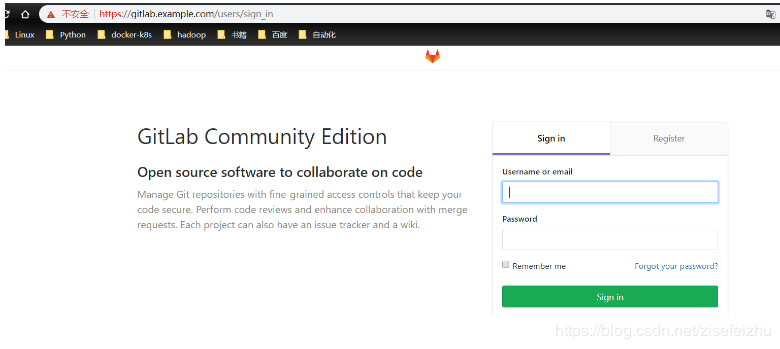
GitLab主界面
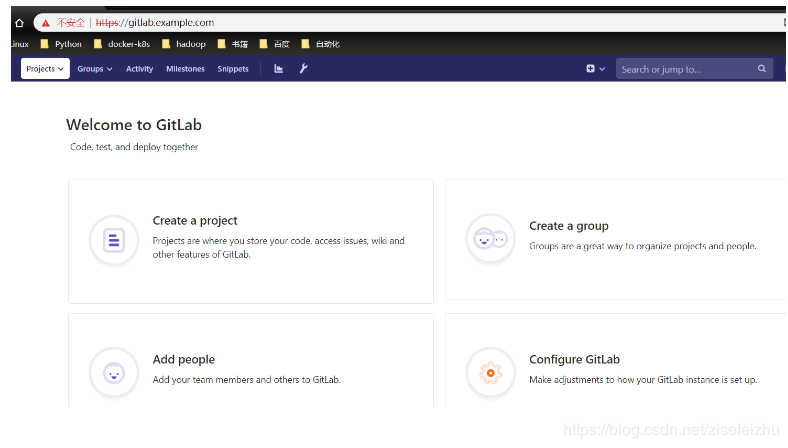
简单介绍GitLab的使用流程
忘记管理员密码
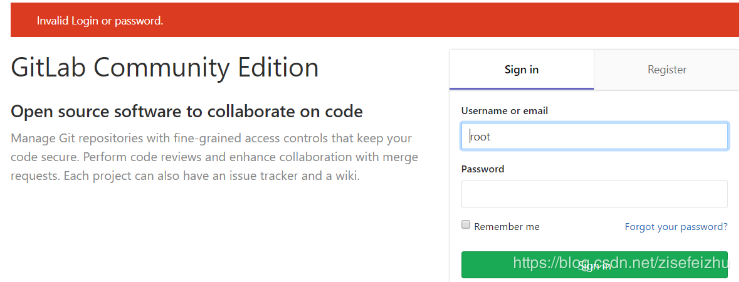
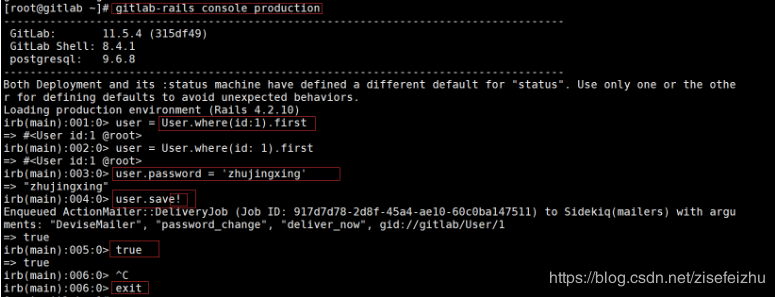
创建新仓库 test-repo
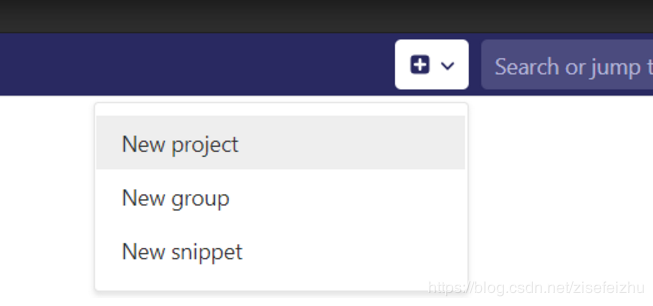
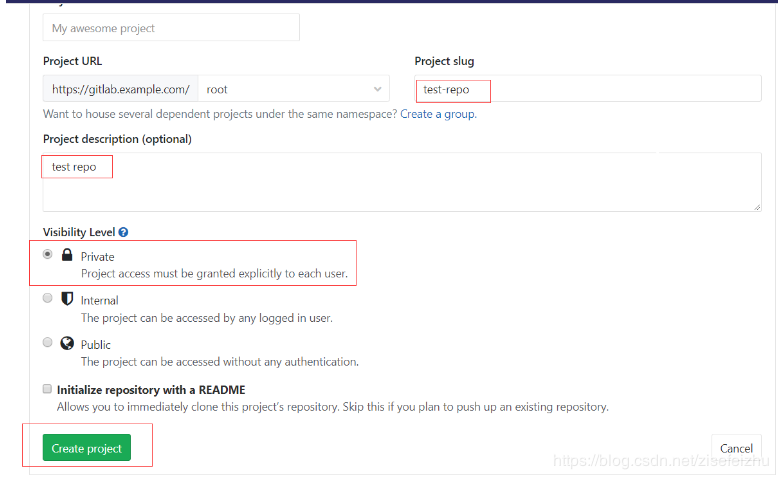
成功创建 【特别声明:下拉有操作步骤例子】
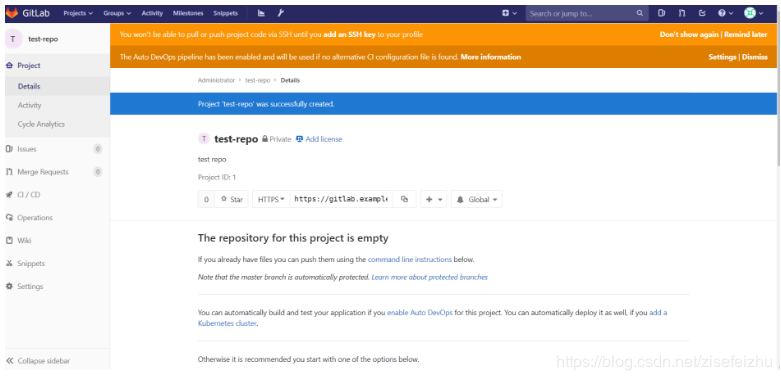

Git Bash安装https://blog.csdn.net/weixin_41714277/article/details/79399270
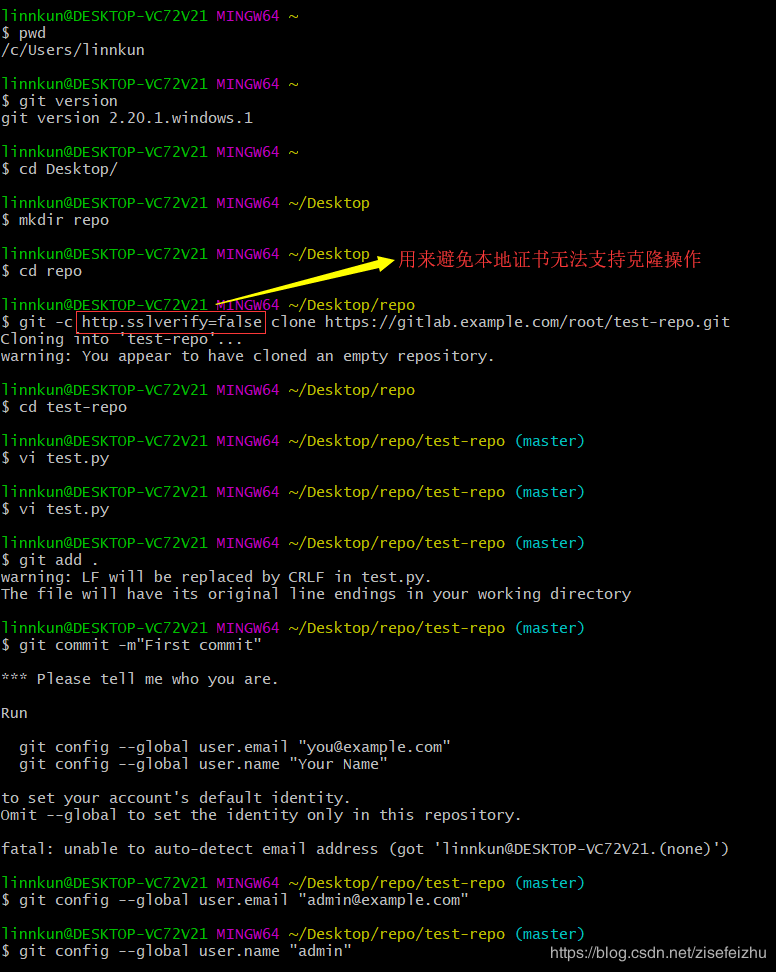
[root@gitlab test-repo]# git -c http.sslVerify=false push origin master
Username for 'https://gitlab.example.com': git页面你设置的用户
Password for 'https://root@gitlab.example.com': git页面你设置的密码
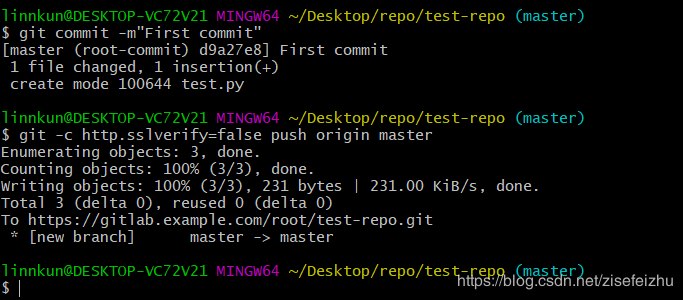
Web界面验证
